Kim Jong Un Visits Samjiyo’n County
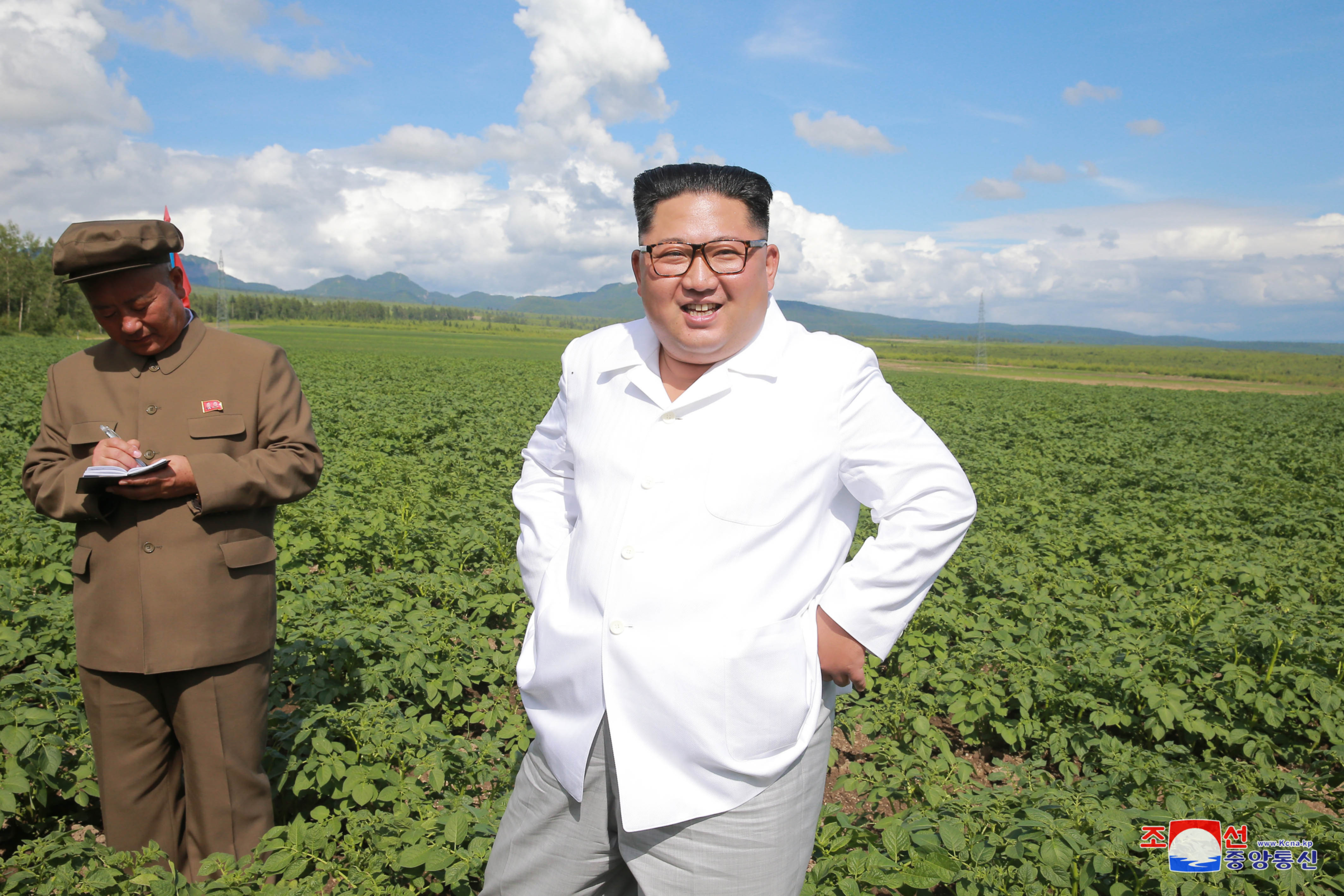
Kim Jong Un smiles during his visit to Junghu’ng Farm in Samjiyo’n County (Photo: Rodong Sinmun).
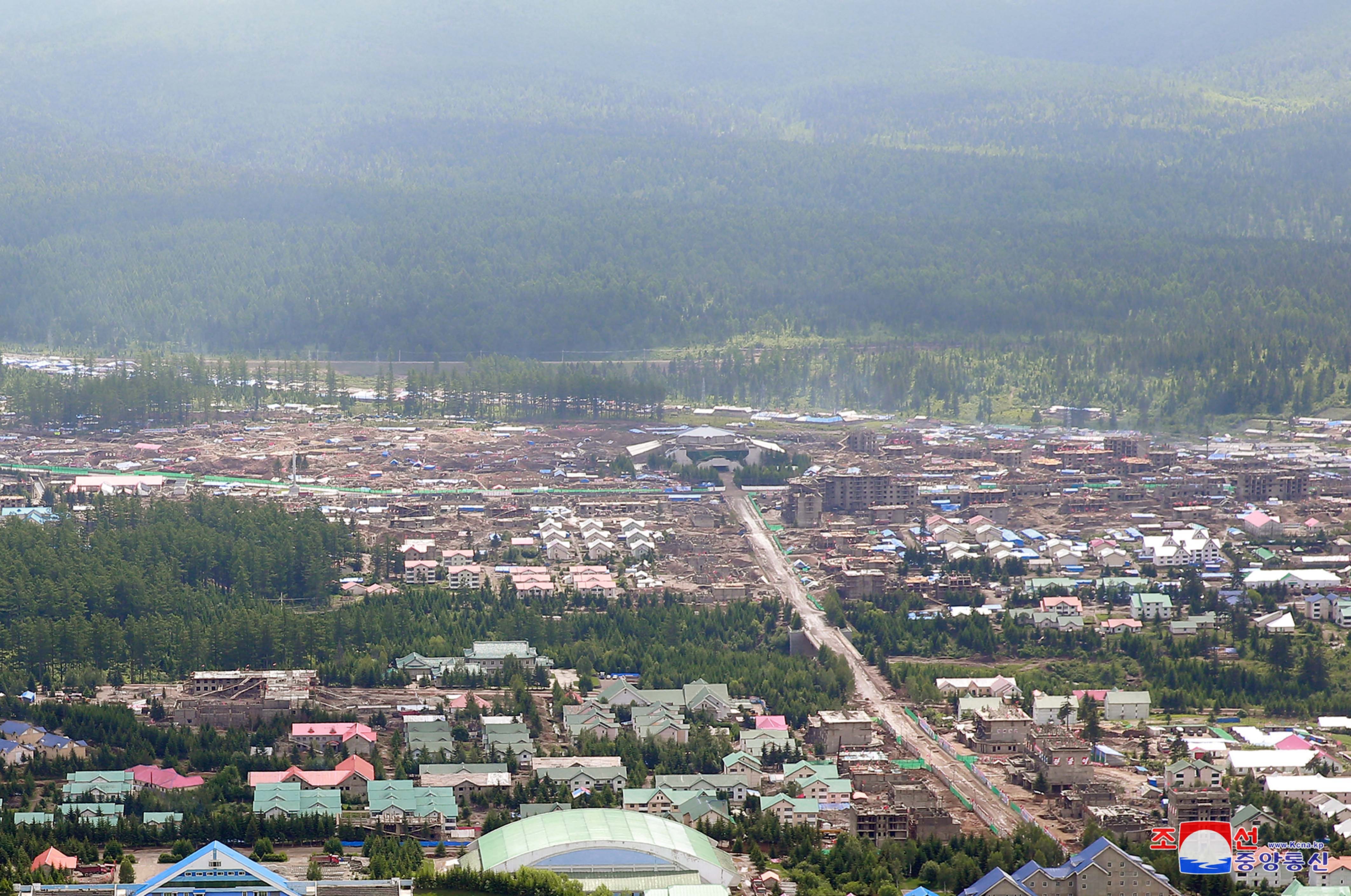
View of fabulous Samjiyo’n County (Photo: KCNA).
KJU’s last observed appearance was his visit to Sinu’iju Textile Mill
Kim Jong Un (Kim Cho’ng-u’n) visited Samjiyo’n County, Yanggang Province for several days of on the spot guidance. Attending his visits, at various points, were senior Workers’ Party of Korea (WPK) officials Hwang Pyong So (Hwang Pyo’ng-so), Kim Yong Su (Kim Yo’ng-su) and O Il Jong (O Il-cho’ng), along with top staffers of the Personal Secretariat Jo Yong Won (Cho Yo’ng-wo’n) and Kim Chang Son (Kim Ch’ang-son) and Yanggang WPK Provincial Committee Chairman Ri Sang Won (Ri Sang-wo’n).
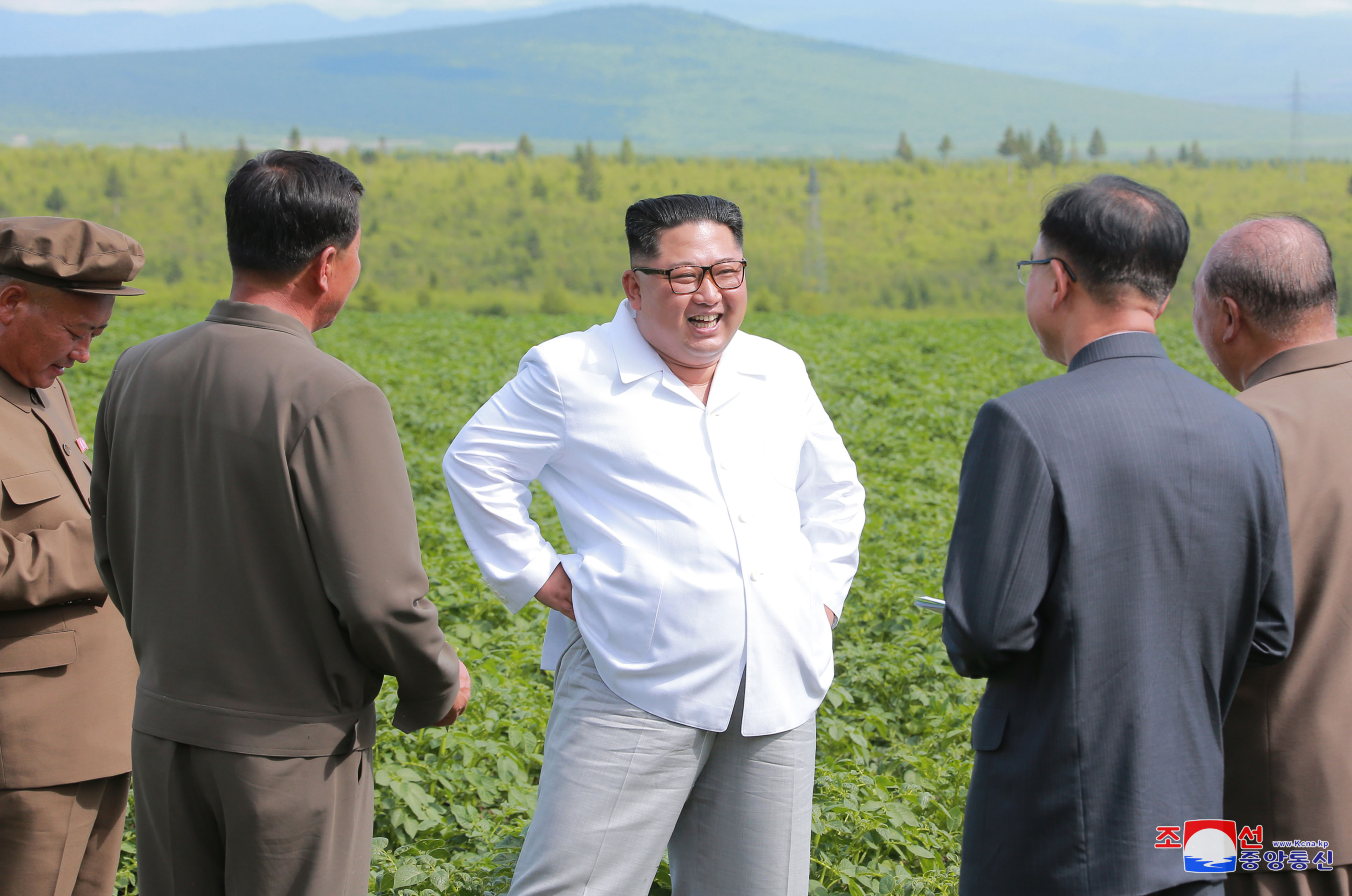
Kim Jong Un talks with Jo Yong Won and a farm official during his guidance tour of the Junghu’ng Farm (Photo: KCNA).
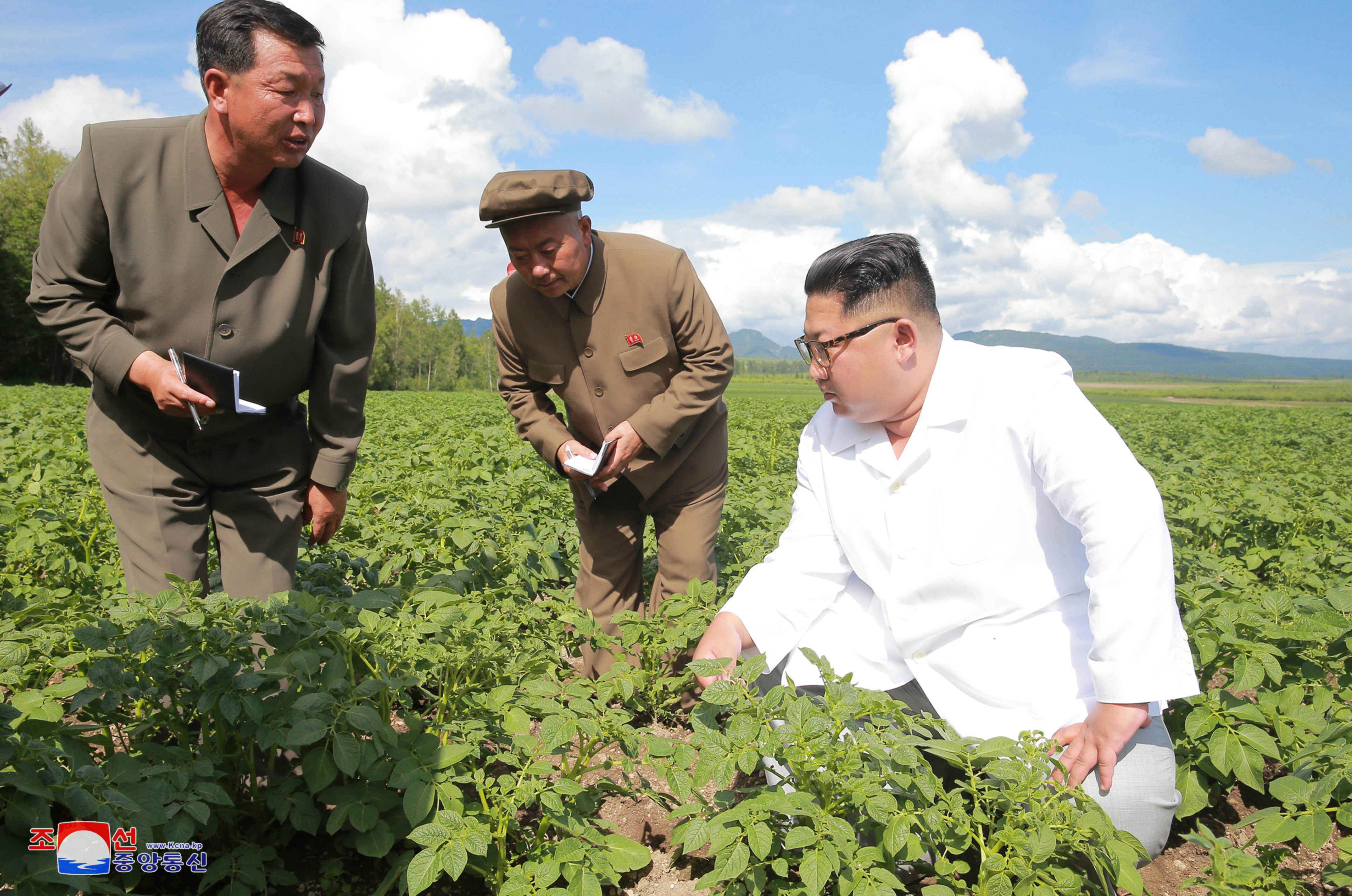
Kim Jong Un inspects potato plants (Photo: Rodong Sinmun/KCNA).
Jong Un visited Junghu’ng Farm, touring a potato field “under the workteam 1 of the farm” and noted that “potato blight and flood damage had an impact on potato harvest during July of previous years” and he inquired “how it is this year.” He “underscored the need for the agricultural field to take thoroughgoing measures of agricultural technique to prevent damage by low temperature and blight, the most knotty problem in potato farming in the northern alpine area.”
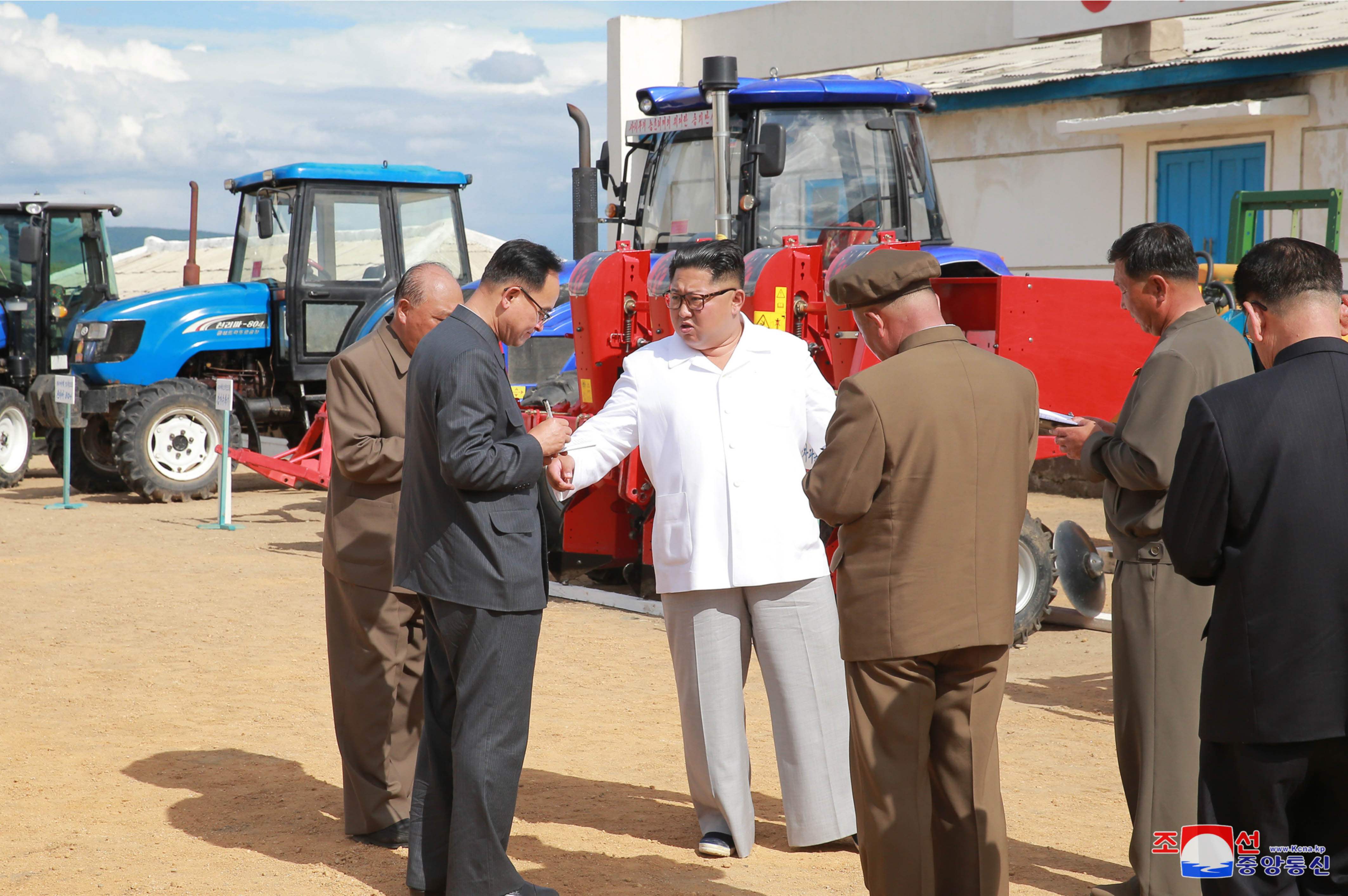
Kim Jong Un examines tractors and other farm equipment at Junghu’ng Farm, Samjiyo’n (Photo: KCNA).
He remarked that “the agronomists and persons in charge of the plots should enhance their responsibility and role so as to intensify predictions and forecasts for potato blight and a strict step should be taken to secure agricultural chemicals and immediately spray them upon sick potato plants.”
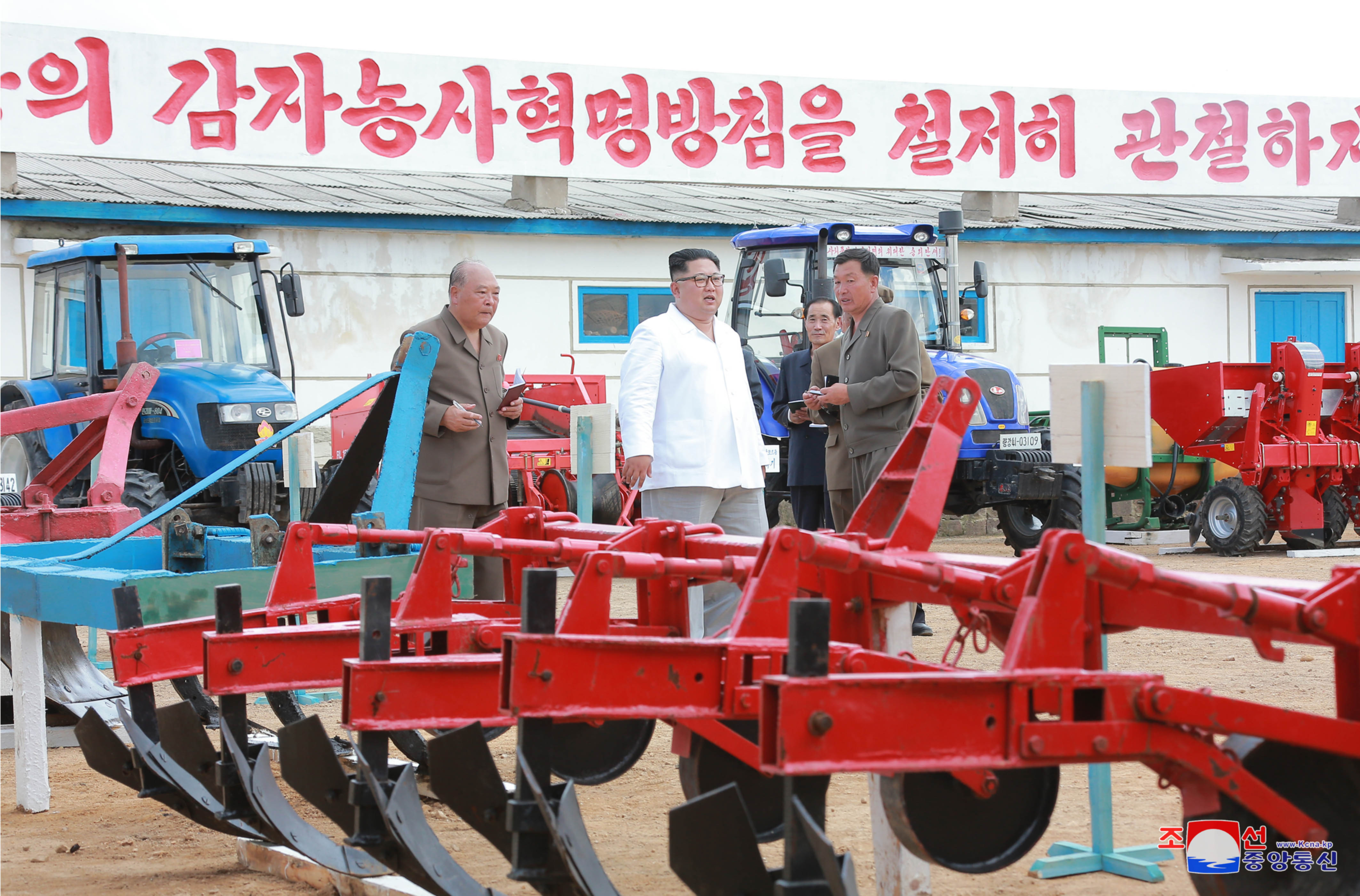
Kim Jong Un is briefed about the plows at Junghu’ng Farm (Photo: Rodong Sinmun/KCNA)
Kim Jong Un “stressed the need to direct efforts to stockbreeding to establish a food production cycle of agriculture and animal husbandry, increase the fertility of the soil of the potato fields and conduct, in a scientific and technical way the manuring and cultivation of potato fields including weeding, earthing up, fertilizing and the extermination of harmful insects.” He examined the tractors and machine and “acquainted himself” with the amount of tractors possessed by the work team and how they are operated.
He asked “with utmost care” the “proportion and level of mechanization of potato farming.” He noted that “the level of comprehensive mechanization of the farm should be raised decisively and indicated that the “agricultural sector sets a good example for mechanization with farm machines secured more than 20 years ago. Comprehensive mechanization should be realized with modern and efficient farm machines in line with the requirements of the steadily changing and developing reality and farm officials should add to their knowledge to know well the global trend of the development of farm machines. and boldly set out to aim high.”
Jong Un remarked that “if they take into full account how many and what kinds of farm machines are needed to do all of the farm work with the help of farm machines then they should, without hesitation, inform the Party of it” and the Party “will work hard to carry it into reality and that it is the Party’s firm determination to first build the farm into an exemplary unit for the modernization of farm machines and, on this basis, turn Samjiyo’n County and its farms into the standard unit of our country who comprehensive mechanization is realized perfectly on a high level and a farm of comprehensive mechanization where the farmers’ ideal has come true.”
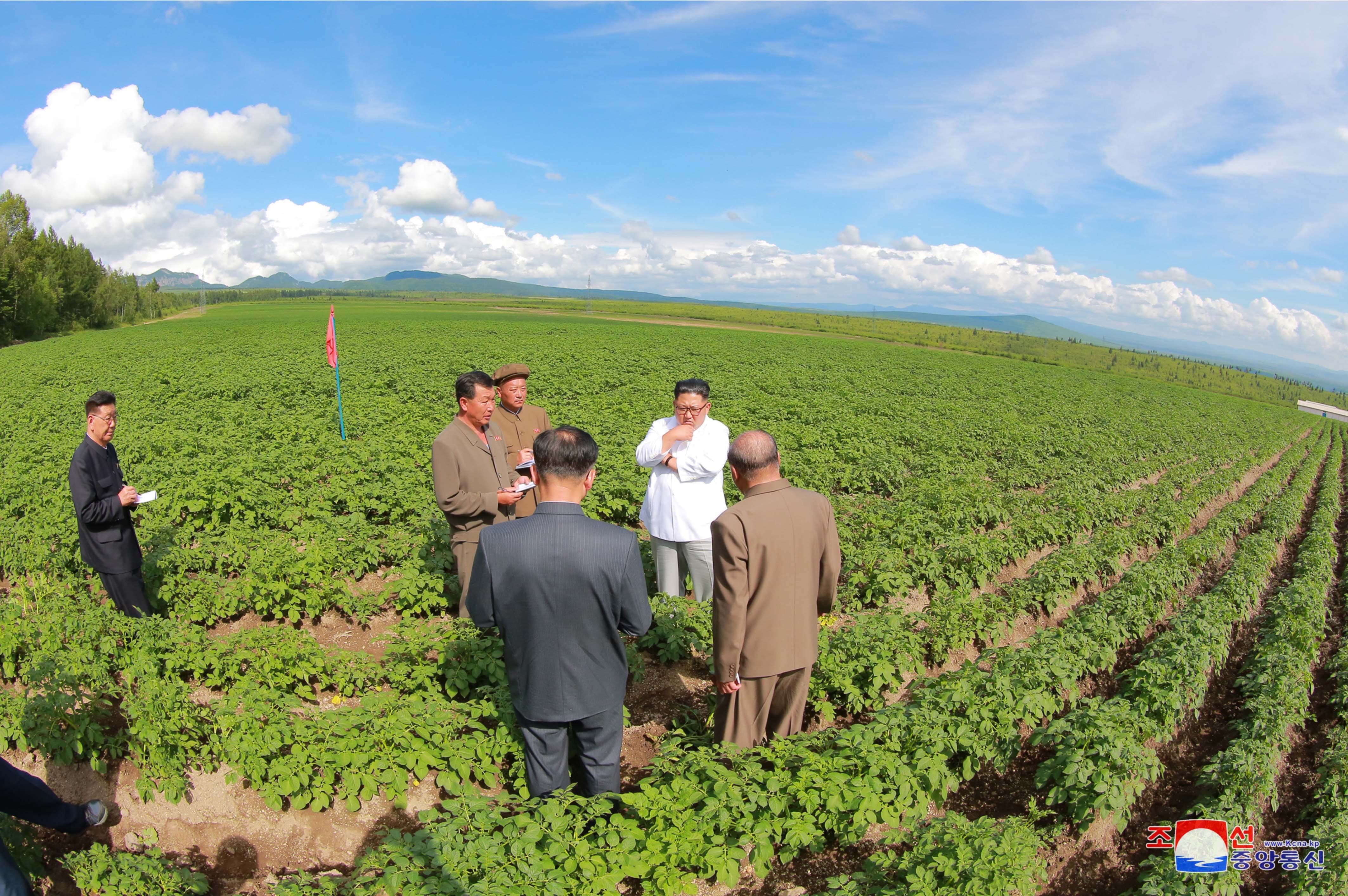
Kim Jong Un in the fields of Junghu’ng Farm, Samjiyo’n. At the left is Hwang Pyong So (Photo: KCNA).
He moved on to a seed storehouse. He appreciated the “introduction of the automated control system of the environment which makes it possible to put the store of seed potatoes on a scientific basis by automatically measure and controlling the temperature, humidity and concentration of carbonic acid gas in the storehouse.” Kim Jong Un “underlined the need to increase the capacity by properly estimating the quantity of seeds to meet the increasing potato fields. Now that seeds are essential for potato farming it is necessary to establish an integral system of producing and keeping seed potatoes and put seed selection on a scientific and technical basis.”
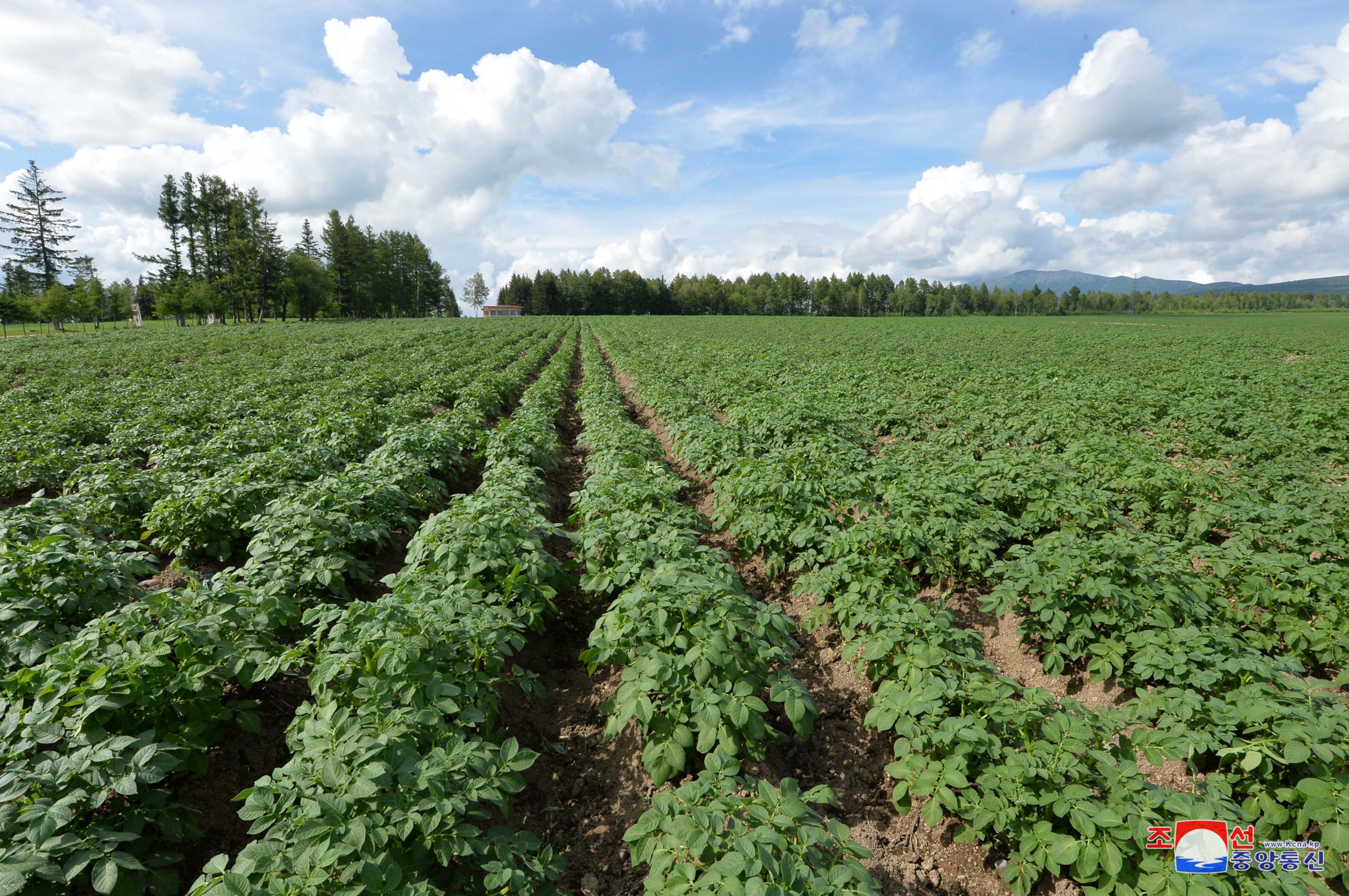
View of potato plants at Junghu’ng Farm in Samjiyo’n County (Photo: KCNA/Rodong Sinmun).
Jong Un remarked that “it is necessary to breed and introduce per-hectare high-yielding potato species and to select and introduce species of potato fit for food as the Potato Farina Production Factory has been built. All the farms should not plant some high-yielding species only, thinking of productivity, but introduce various species good to taste and ensure the quality of processed potato foods in production and thus raise the quality of potato production.”
As he toured the farm he “set forth the plan and direction for sprucing up the seat village (u’p) in Junghu’ng-ri, Samjiyo’n County.” Kim Jong Un underscored “the need to first remodel the units associated with the leadership exploits of President Kim Il Sung (Kim Il-so’ng) and leader Kim Jong Il (Kim Cho’ng-il) such as the Junghu’ng Farm visited by them several times and then, on the basis of experience, gradually change all the farms in the county. The county shouldn’t cling to only remodeling the township, but propel it with the work to remodel the farm villages on a full scale.”
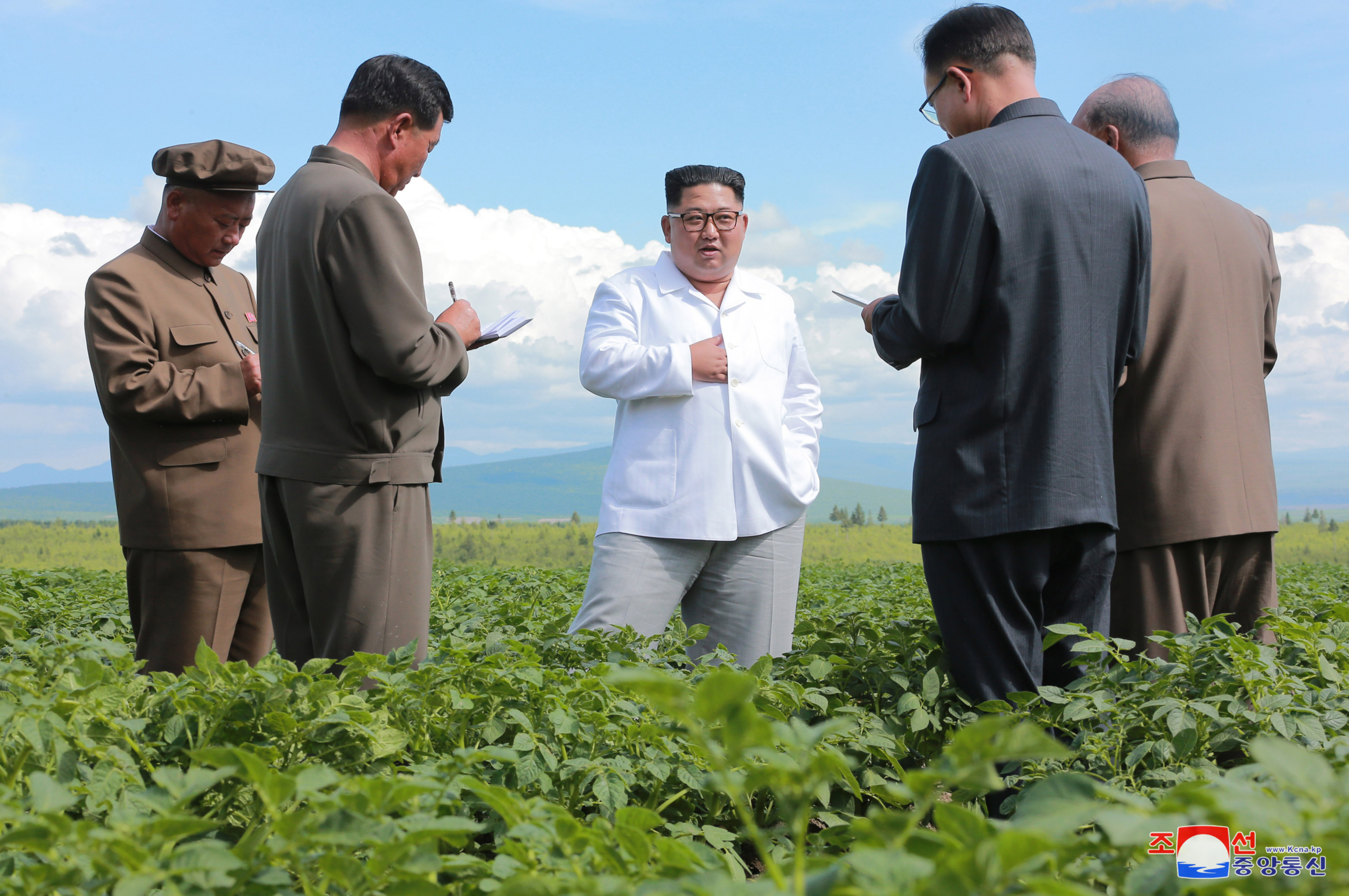
Kim Jong Un issues instructions during his visit to Junghu’ng Farm (Photo: Rodong Sinmun).
He said that the “Party would actively help build the Junghu’ng Farm into a standard unit of village development” and issued “instructions on properly estimating and reporting the necessary materials and labor. This meaningful year seeing the lapse of 20 years since the Party advanced the policy of bringing about a radical turn in potato farming, we have to realize without fail the wishes of Kim Jong Il who was so anxious about the issue of potato farming in Ryanggang Province by producing a high yield of potatoes in the native land of Kim Jong Il.”
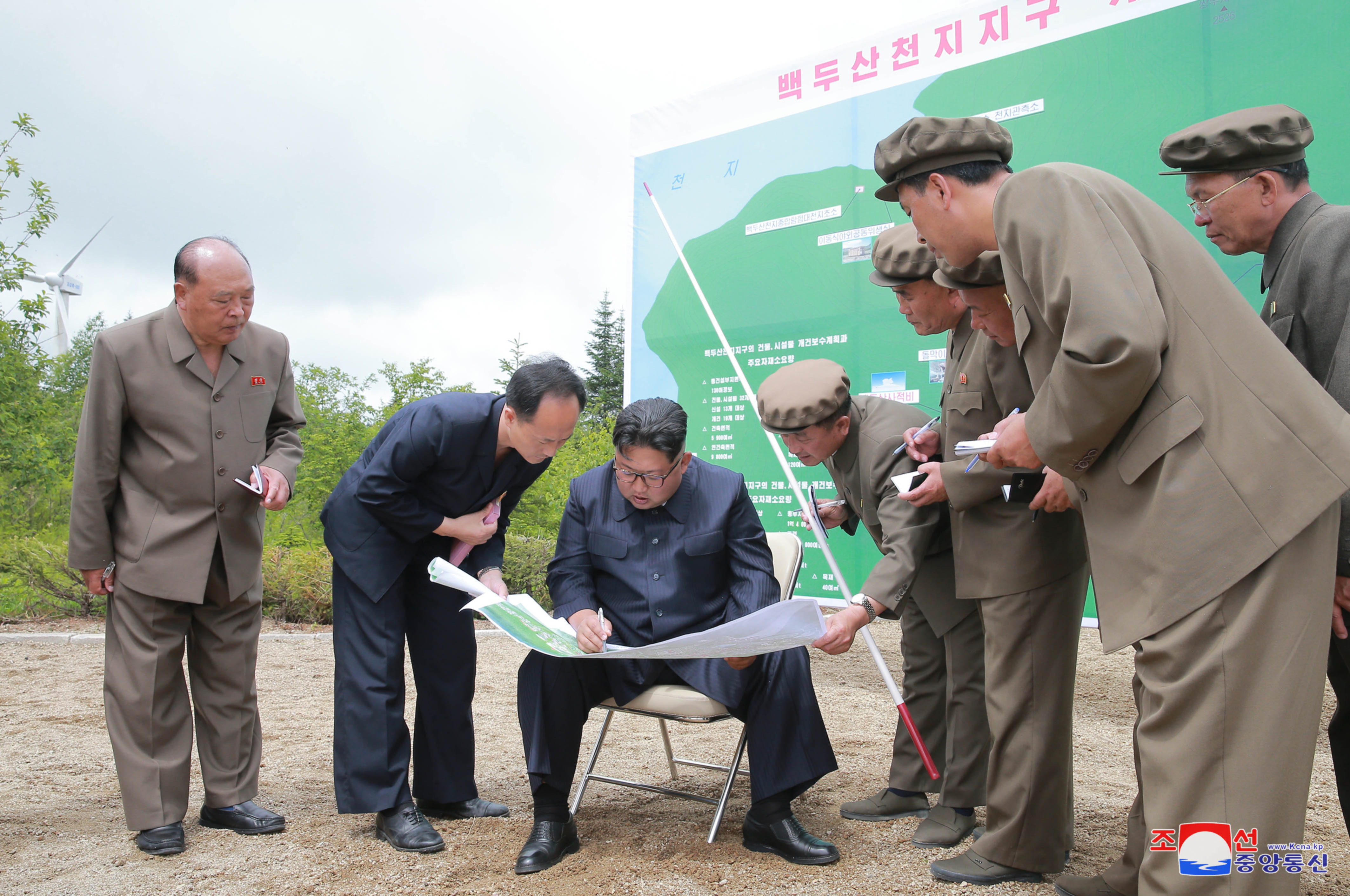
Kim Jong Un is briefed about the development of Samjiyo’n County (Photo: KCNA/Rodong Sinmun).
Kim Jong Un also provided on the spot field guidance to construction sites and development zones in Samjiyo’n County. He started off examining a master development plan and zoning map, while being briefed about the construction work from a hilltop observation point. He issued “an instruction to include the plan for expanding and developing the area extending to the shore of Lake Samji.” He said that “color of coating materials and metal roofing materials of the buildings should be harmoniously matched to their use and features and the color of the exterior walls should be selected to suit well the natural forests of Mt. Paektu.”
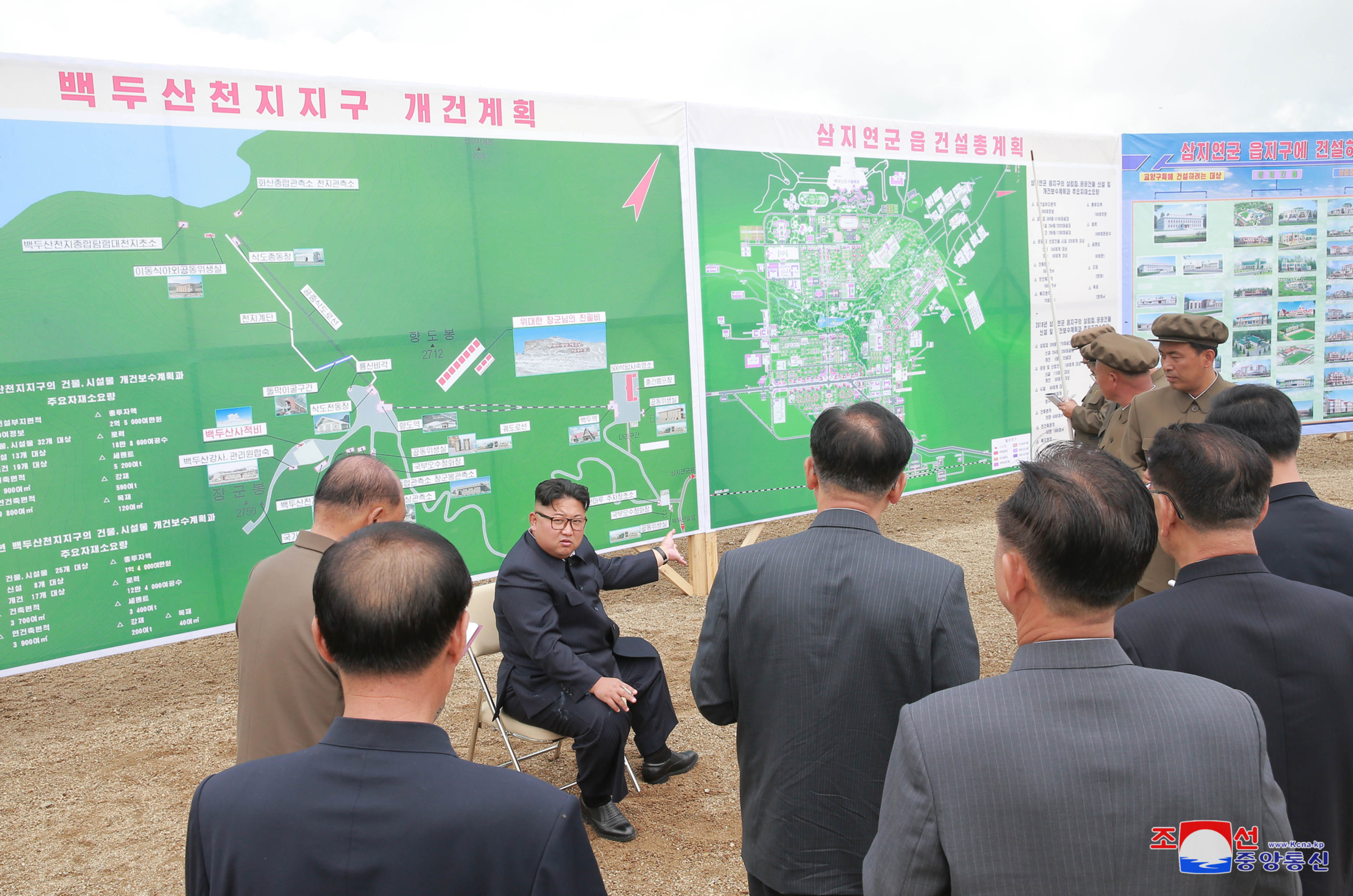
Kim Jong Un issues instructions about construction in Samjiyo’n County (Photo: Rodong Sinmun).
Jong Un remarked that “the construction of Samjiyo’n County should be conducted, divided into the areas of education, dwelling houses, modern streets, industry, sports and cultural education, commercial service and tourism, in according with the ratified master plan.”
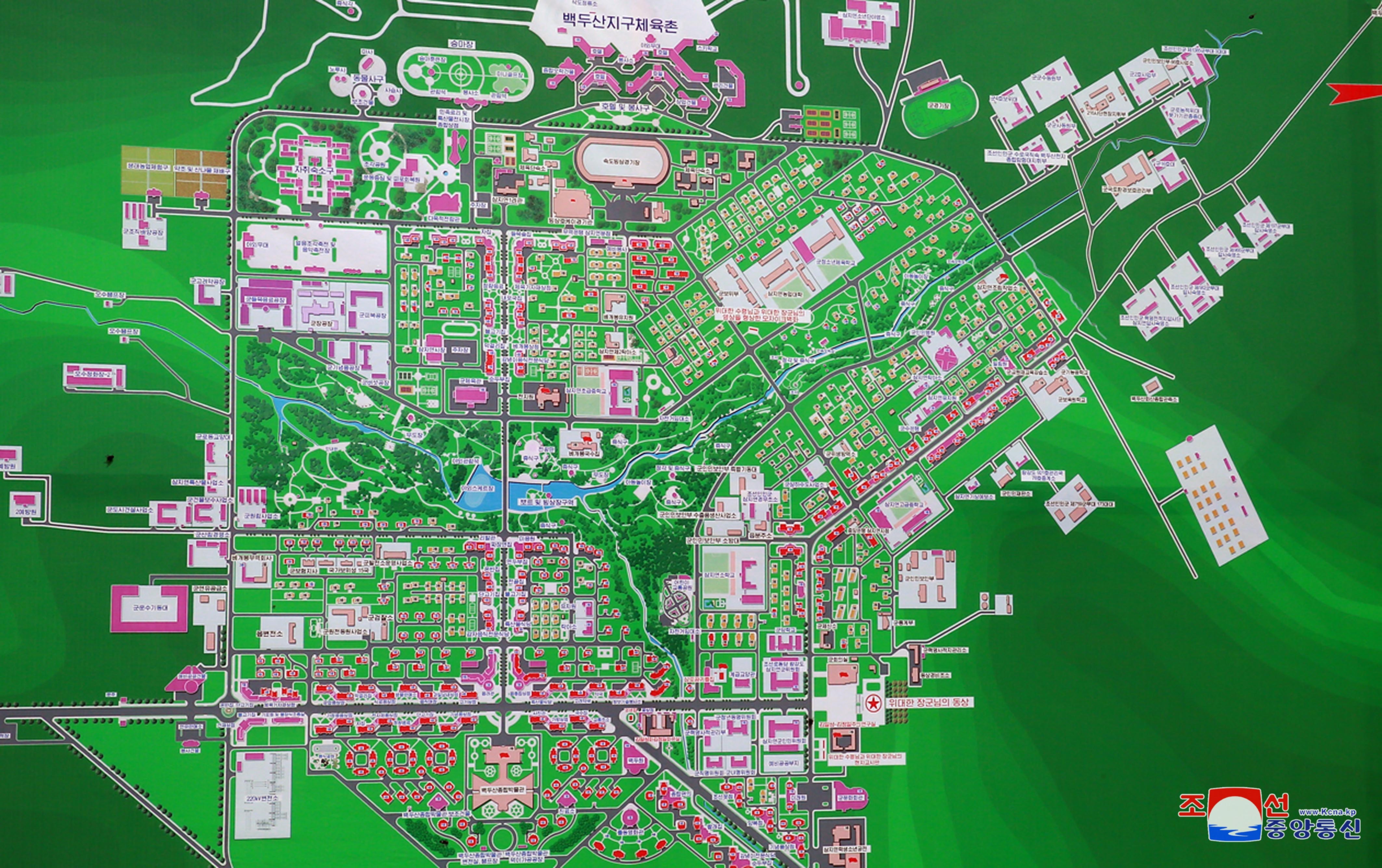
Map of the development plan of Samjiyo’n (Photo: Rodong Sinmun).
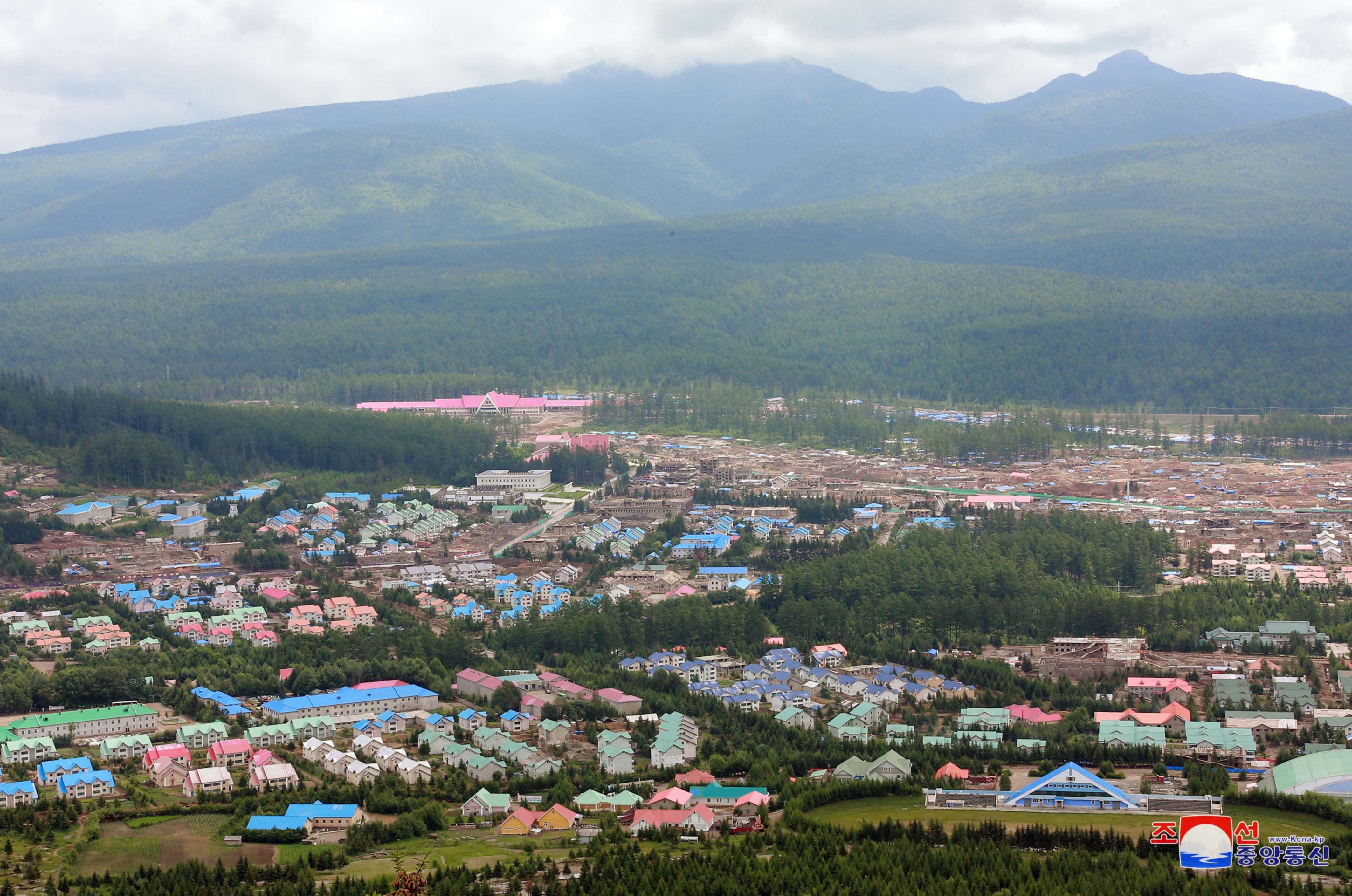
Overview of Samjiyo’n (photo: KCNA)
He said the “a model of a city with modern civilization in the mountains should be made in the construction of Samjiyo’n County and the appearance of the counties in the mountains of our country should be spruced up and built well by generalizing the experience and this process should be an occasion of great leap and a revolution of local construction. As the township construction amidst the concern and support of the whole Party, state and society, it should be finished in the short period by scrupulously organizing the guidance and supply according to a three-dimension and blitz warfare formula.”

Kim Jong Un is briefed about zoning in Samjiyo’n County (Photo: KCNA).
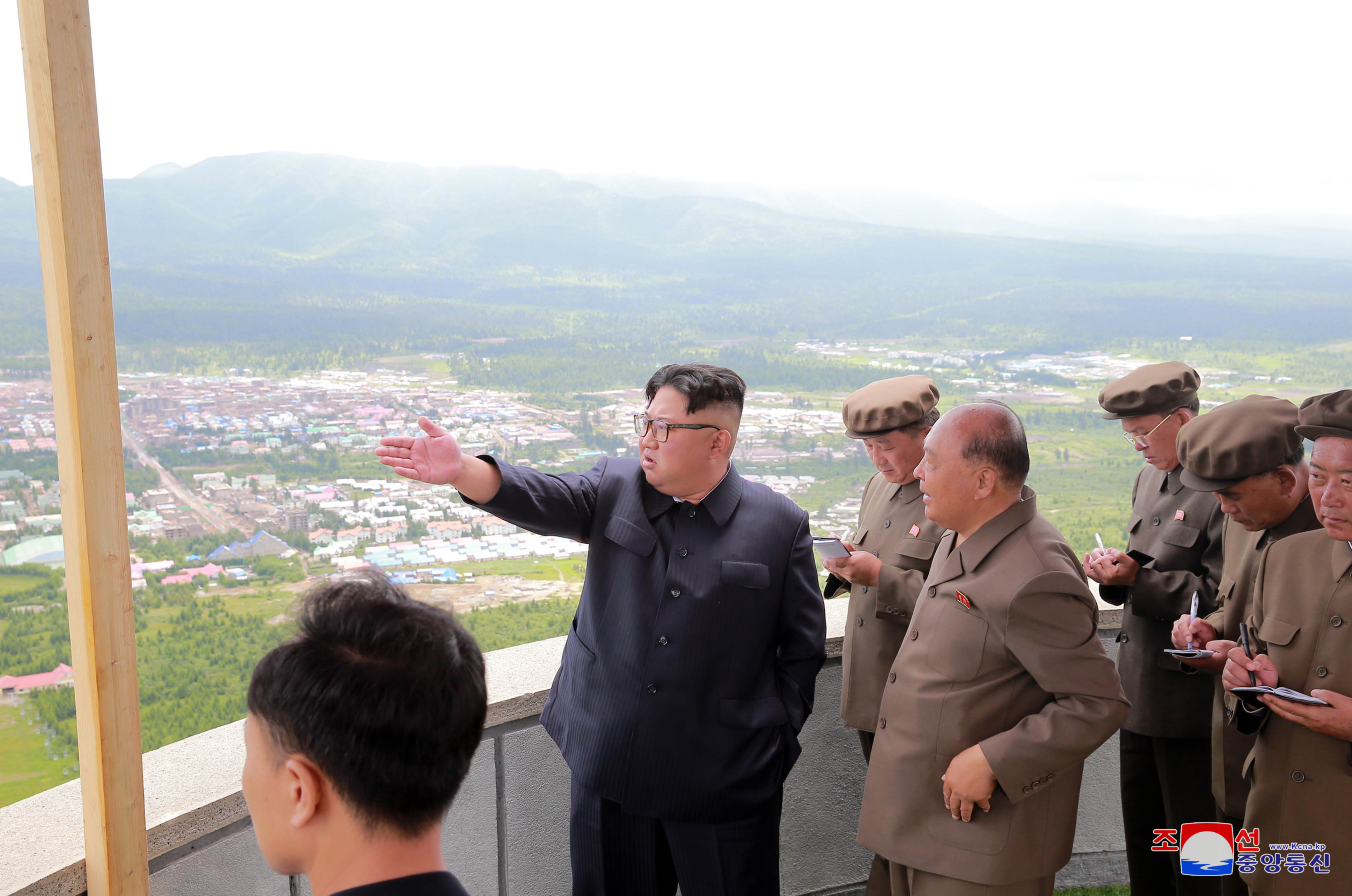
Kim Jong Un talks with Ri Sang Won, Chairman of the Ryanggang WPK Provincial Committee, from an observation spot on Pegae-bong, Samjiyo’n (Photo: Rodong Sinmun).
Kim Jong Un underscored “the need to introduce construction methods for the features of the northern area with heavy snowfall and low temperatures and ensure the quality of construction on the highest level by intensifying the guidance and supervision of construction without concentrating on the speed only.” He said it was necessary to make a good design of forestation and tree planting according to the districts of the township area of the county and stressed the need to plant a number of white birch, a favorite tree of leader Kim Jong Il.”
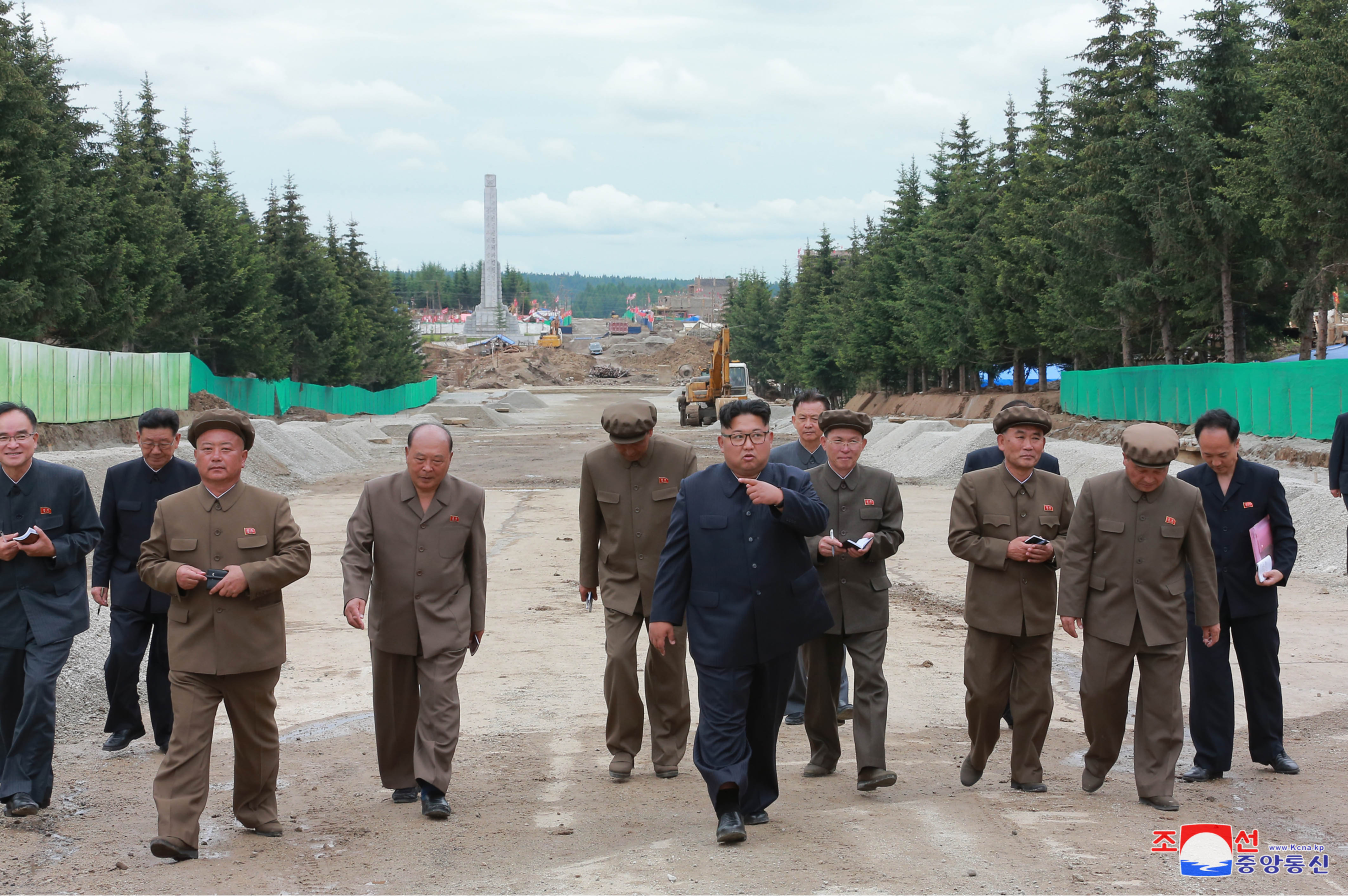
Kim Jong Un inspects a construction site in Samjiyo’n County (Photo: KCNA).
Jong Un toured the Revolutionary Battle Sites Management Office near the “Secret Camp of Mt. Paektu” and lodging houses for study tour tourists and was briefed about its construction. He said that “many units are engaged in the construction of the county and state construction supervision institutions should establish an orderly supervisory system and make increasingly exact demands.
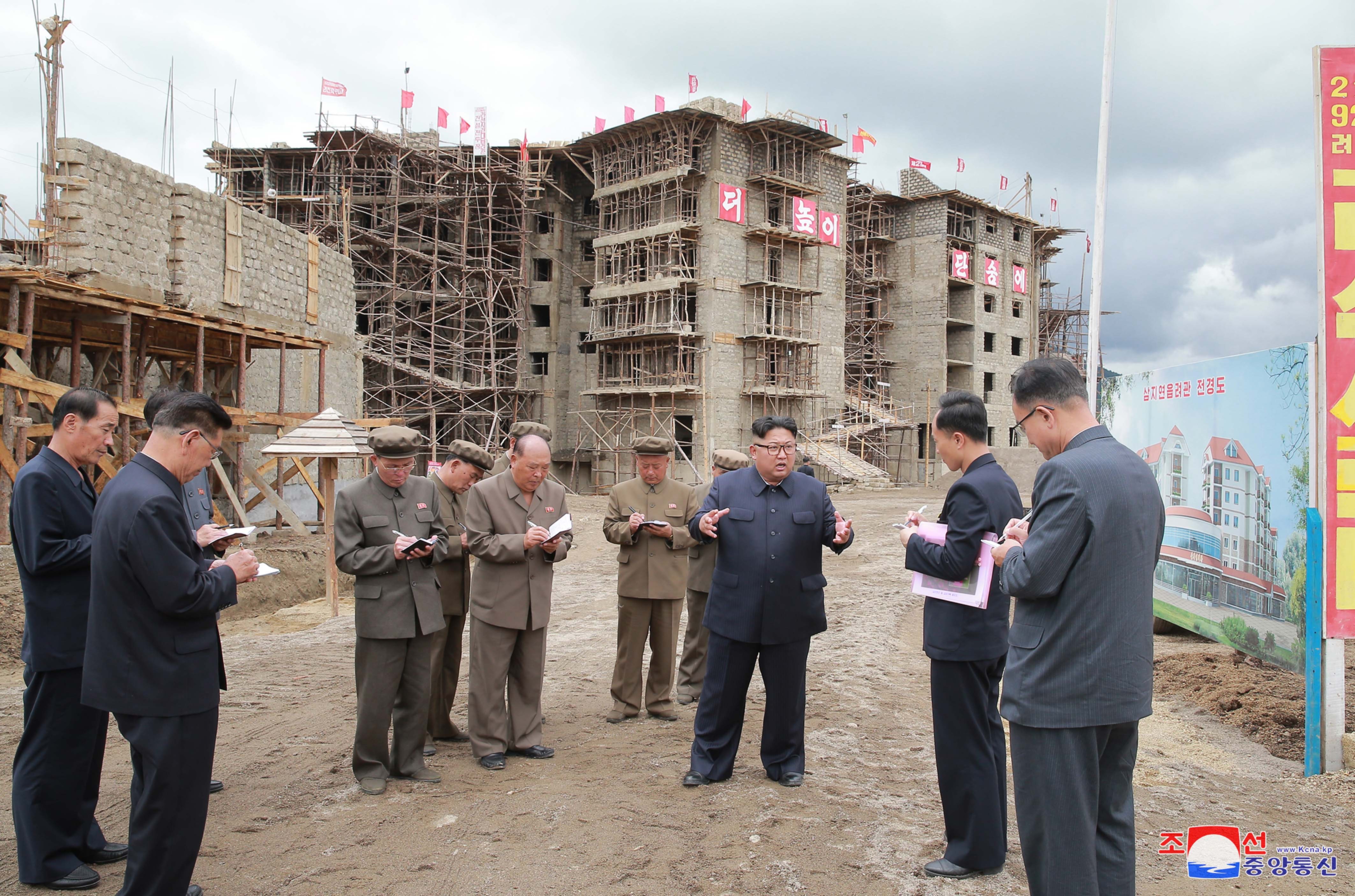
Kim Jong Un issues instructions about construction in Samjiyo’n (Photo: Rodong Sinmun)
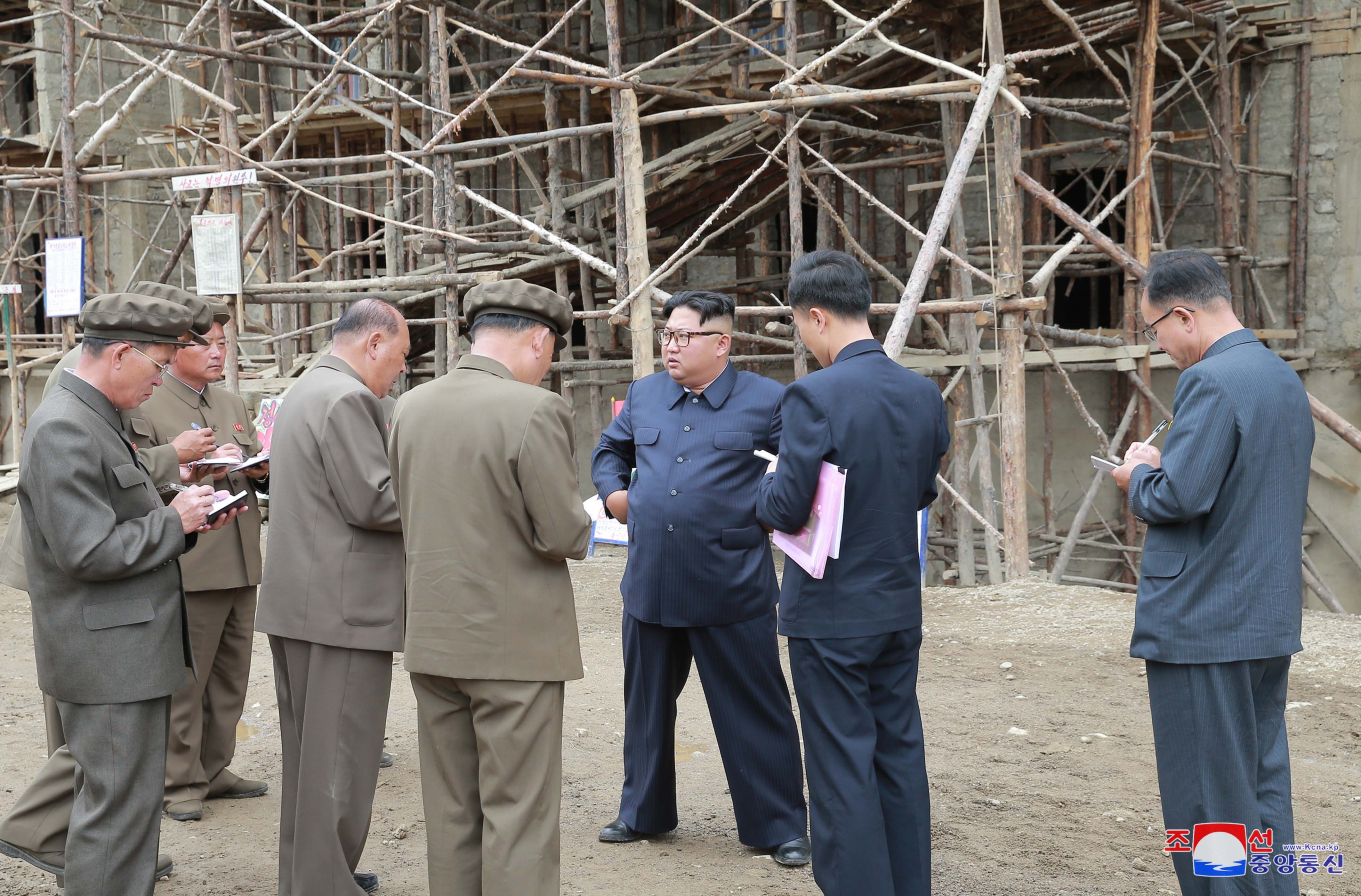
Kim Jong Un tours construction in Samjiyo’n (Photo: KCNA).
As he walked around the Rimyo’ngsu area he remarked that “various dwelling houses and buildings should be placed in a diverse and unique way along the side of the ravine, preserving the characteristics of nature and topography.” Kim Jong Un stressed that “during the county’s construction, the forest mustn’t be wrecked” and he called for “preserving the ecological environment in Mt. Paektu area intact, mindful that the area is a sacred place of revolution where every tree and every blade of grass can never be neglected.”
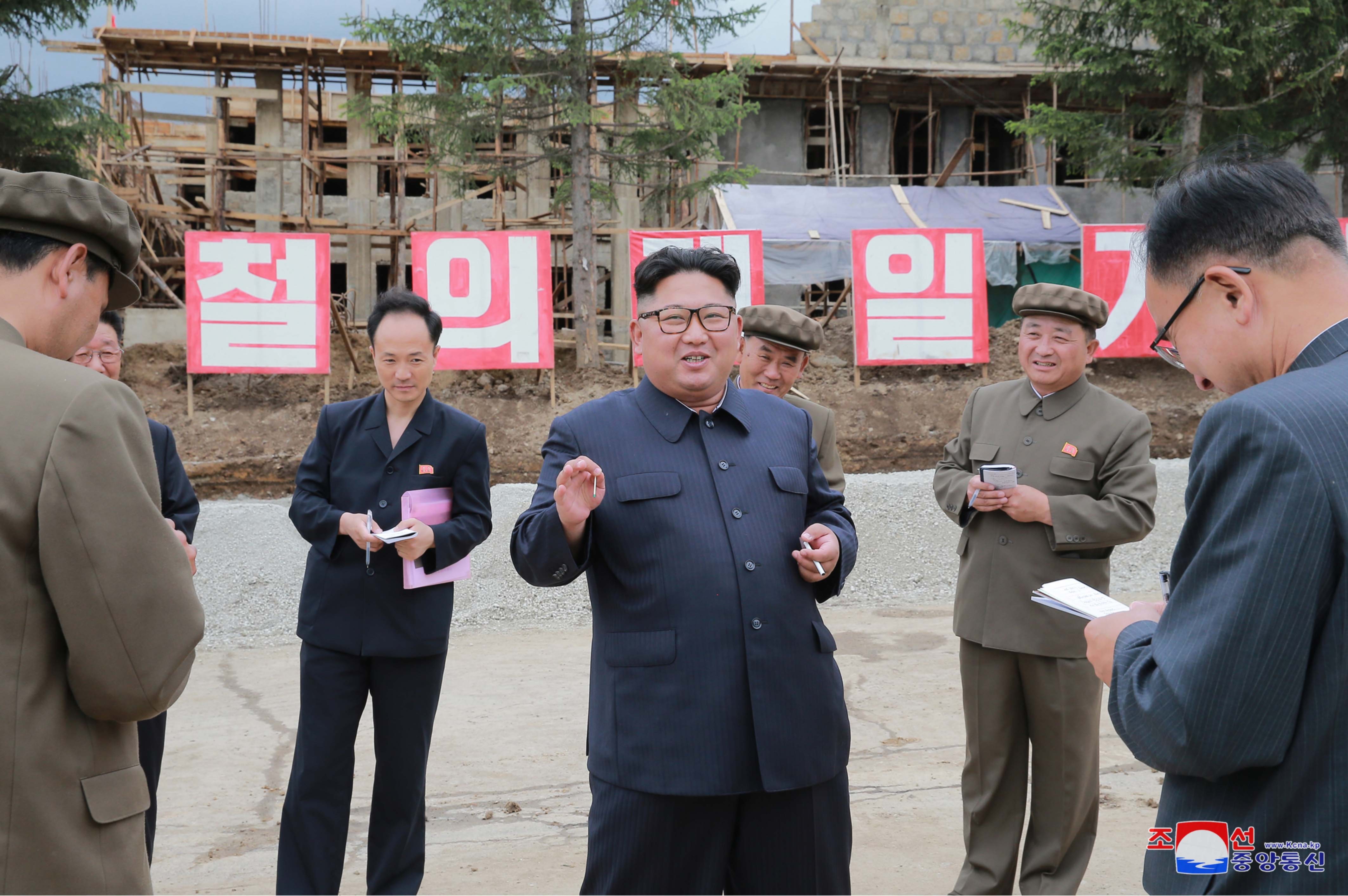
Kim Jong Un holds a match and cigarette during his visit to construction sites in Samjiyo’n (Photo: Rodong Sinmun).
Jong Un said that “through the work to spruce up Samjiyo’n County, we should renew not only the appearance of the township area, but also the mental conditions of people and let the county play its role as a host not making its independence and spirit of self-reliance fade while the whole country is aiding the county. The county should create a revolutionary spirit in the new century, a new spirit of the times in the course of building itself into a communist dreamland.”
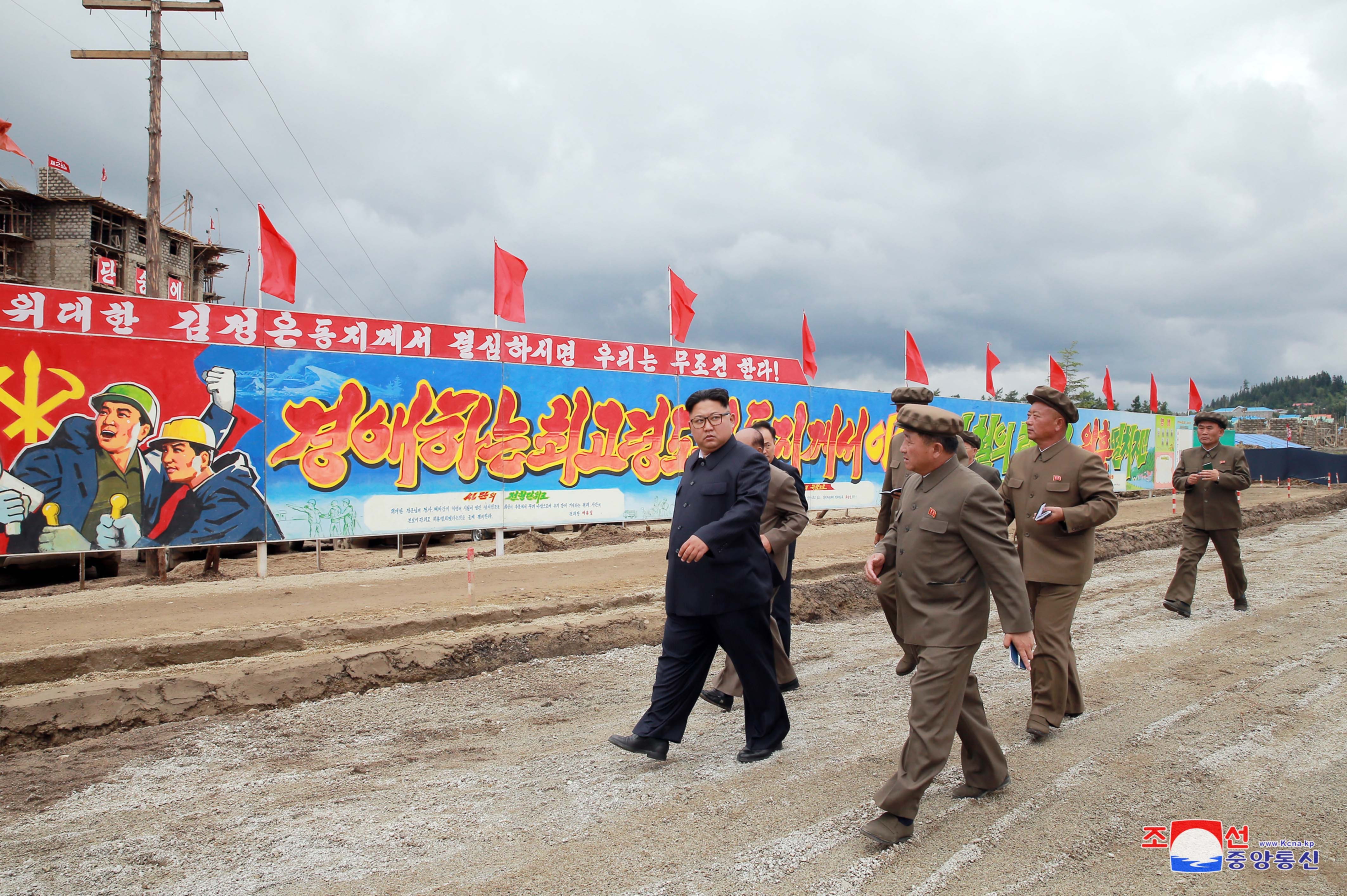
(Photo: Rodong Sinmun
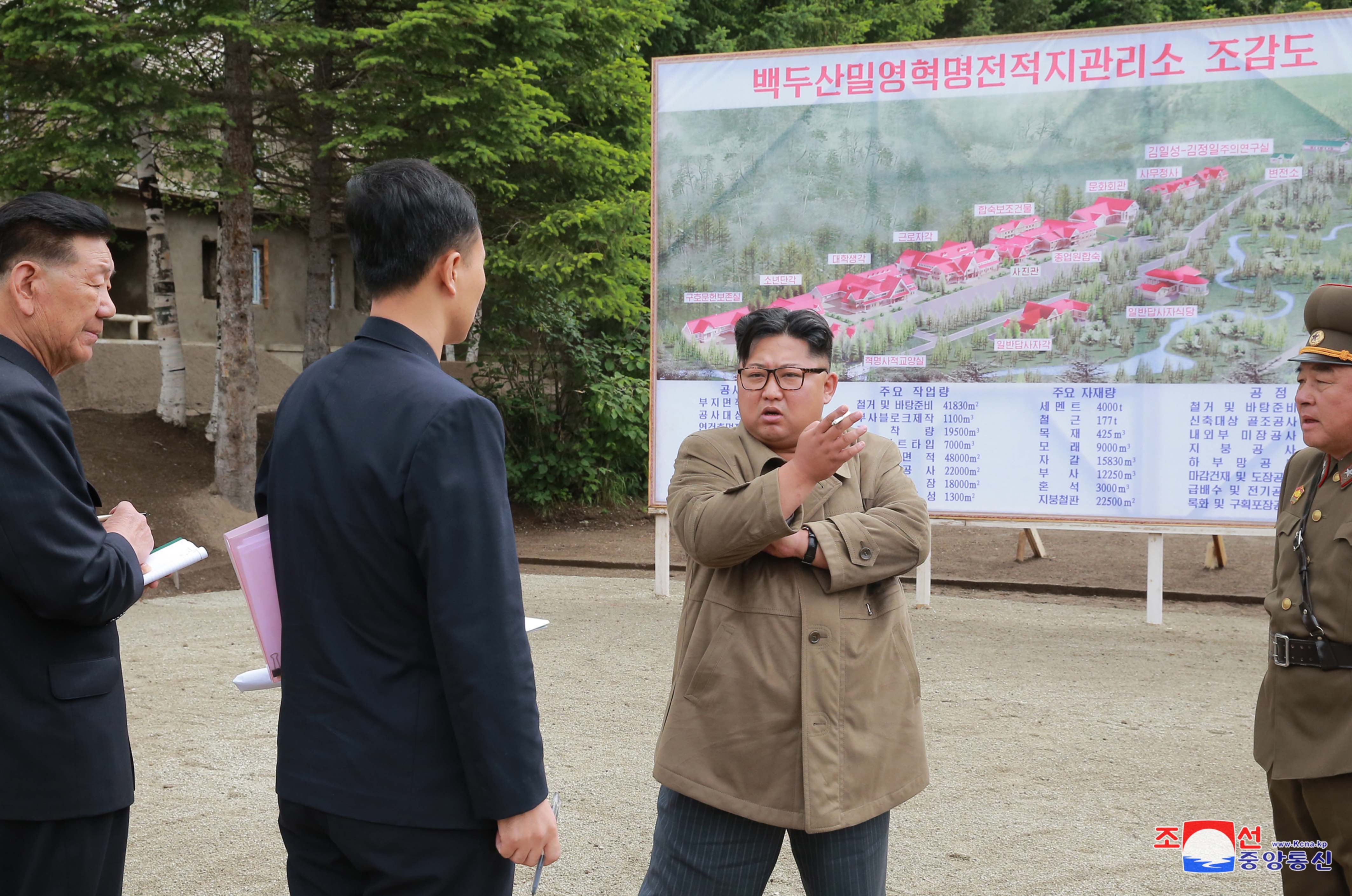
Kim Jong Un issues instructions on developing revolutionary sites in Samjiyo’n (Photo: KCNA/Rodong Sinmun)
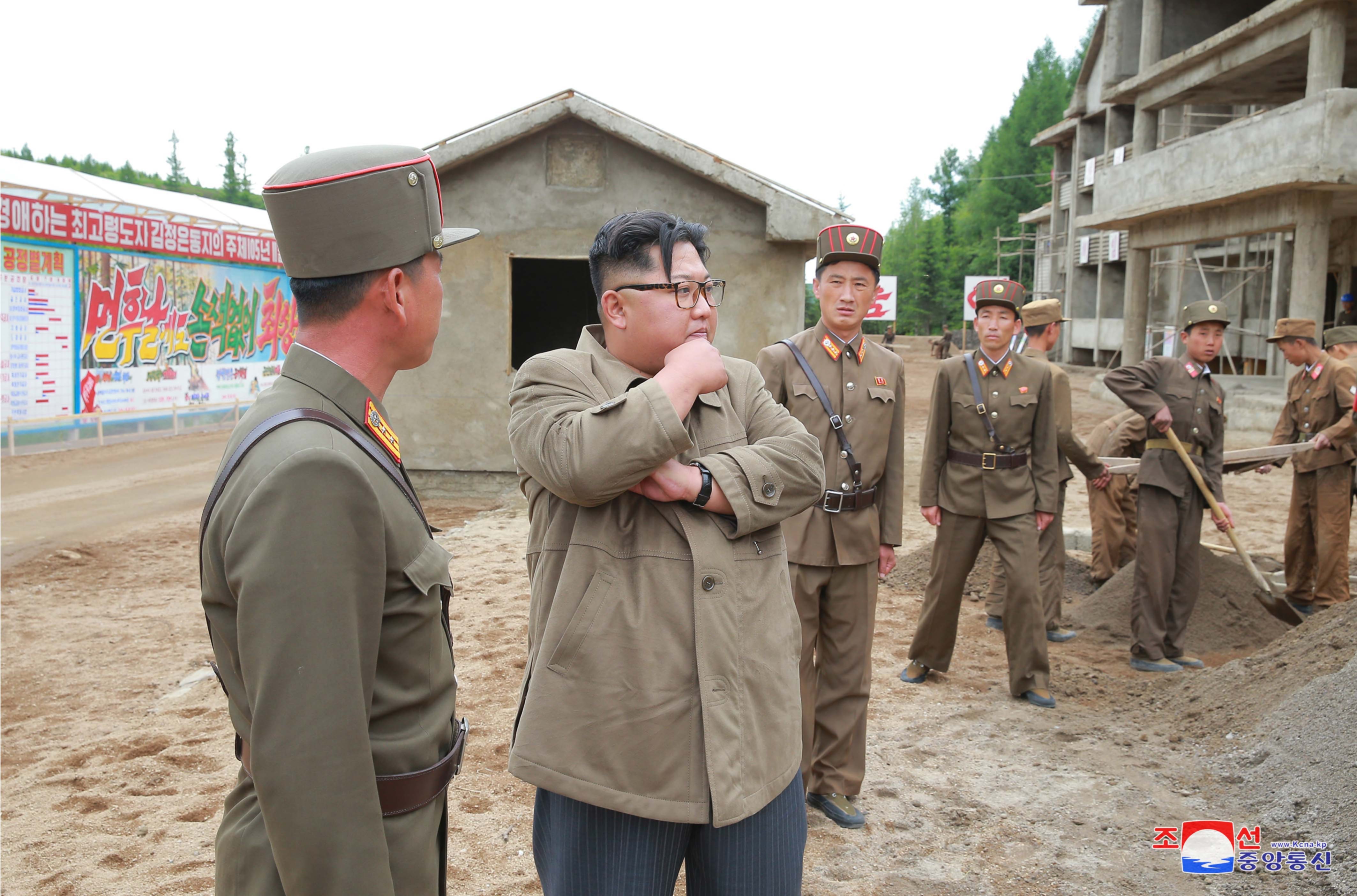
Kim Jong Un is briefed about construction (Photo: KCNA).
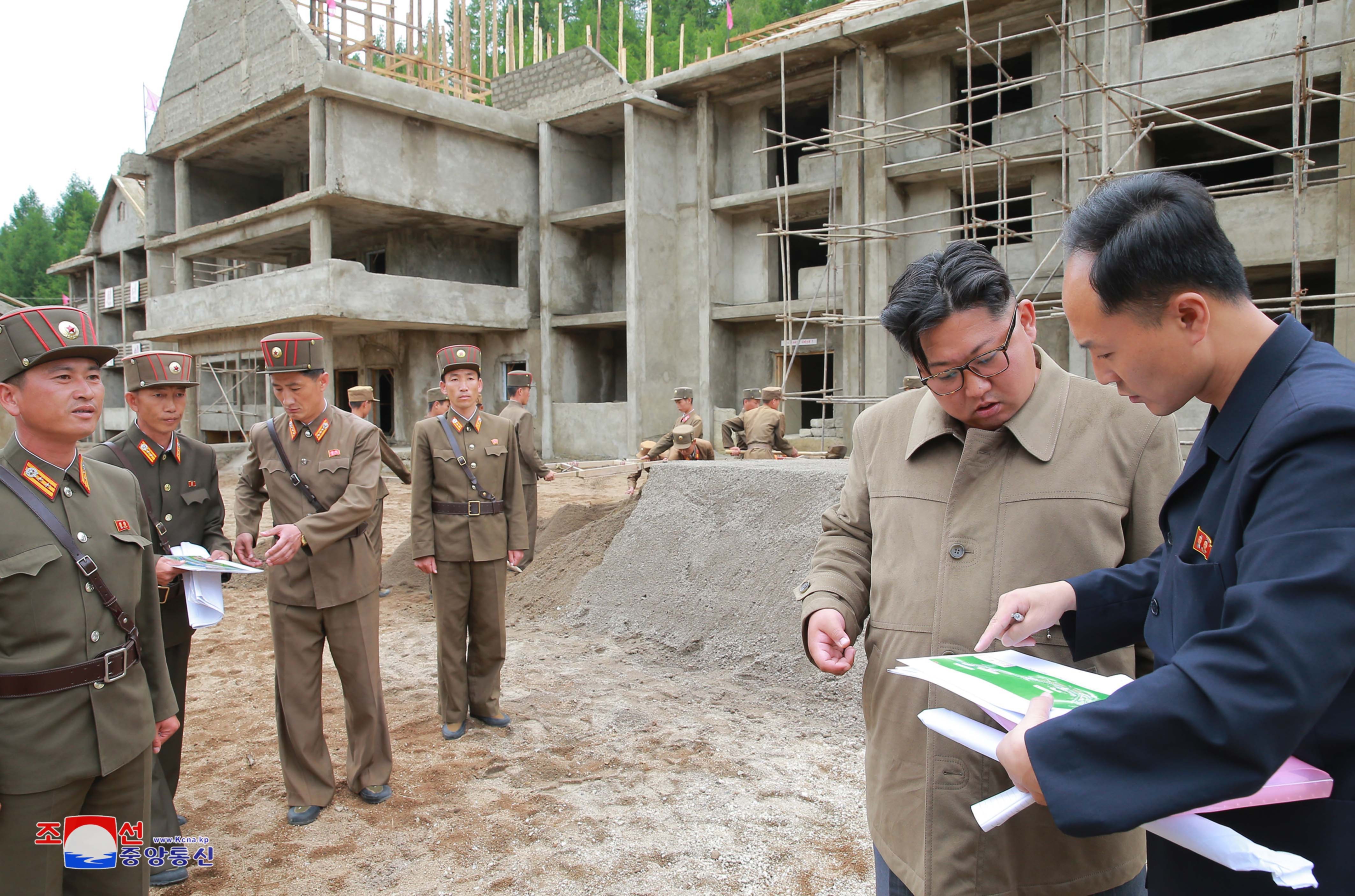
Kim Jong Un is briefed about design at a construction site in Samjiyo’n (Photo: Rodong Sinmun/KCNA).
He further noted that “the construction of the county has undergone a lot of progress” and thanked “the builders for faithfully devoting themselves to the work for sprucing up the county into one that is flawless in every aspect.”
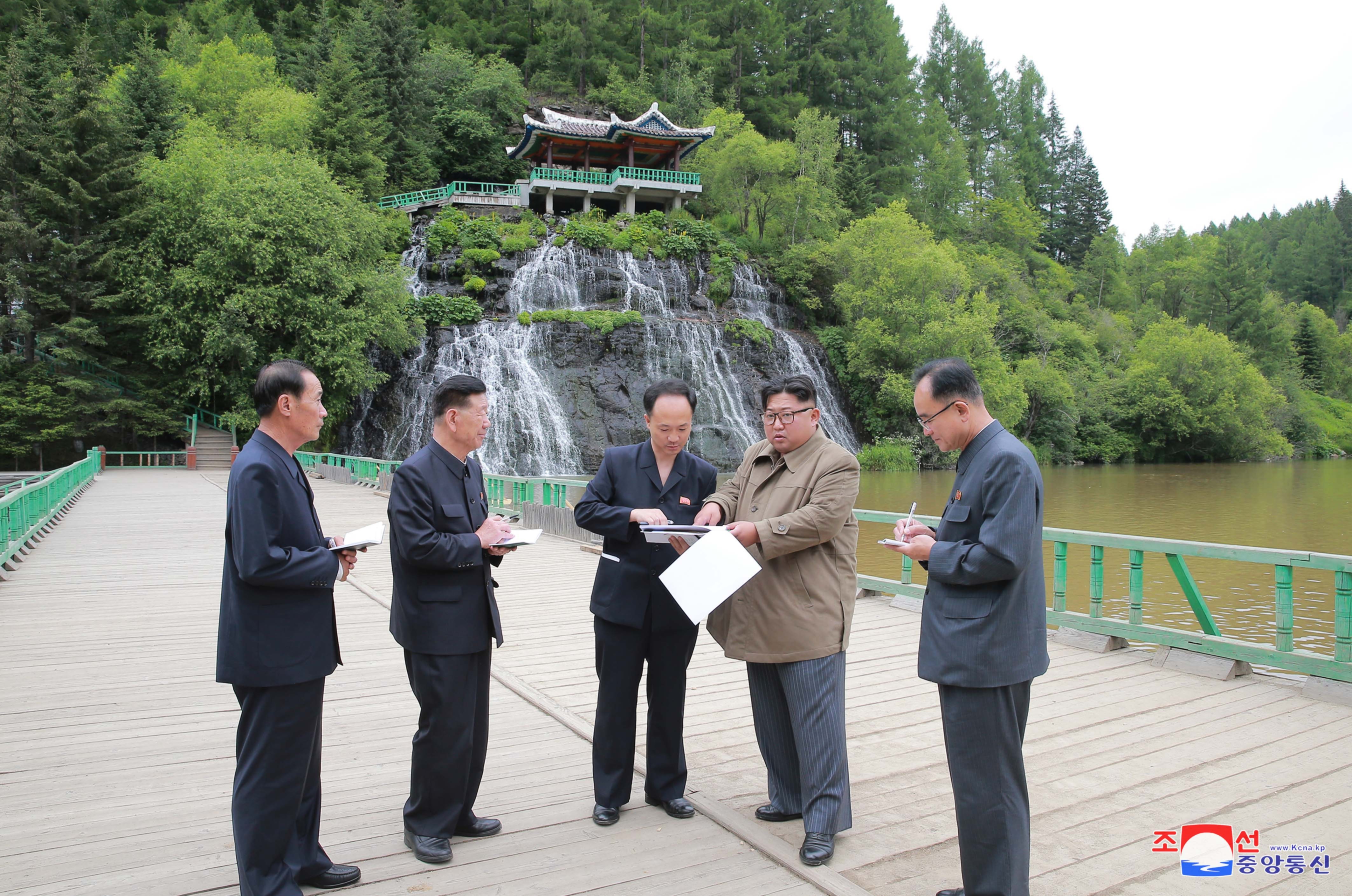
Kim Jong Un tours construction sites in Samjiyo’n County (Photo: KCNA).

(Photo: KCNA)
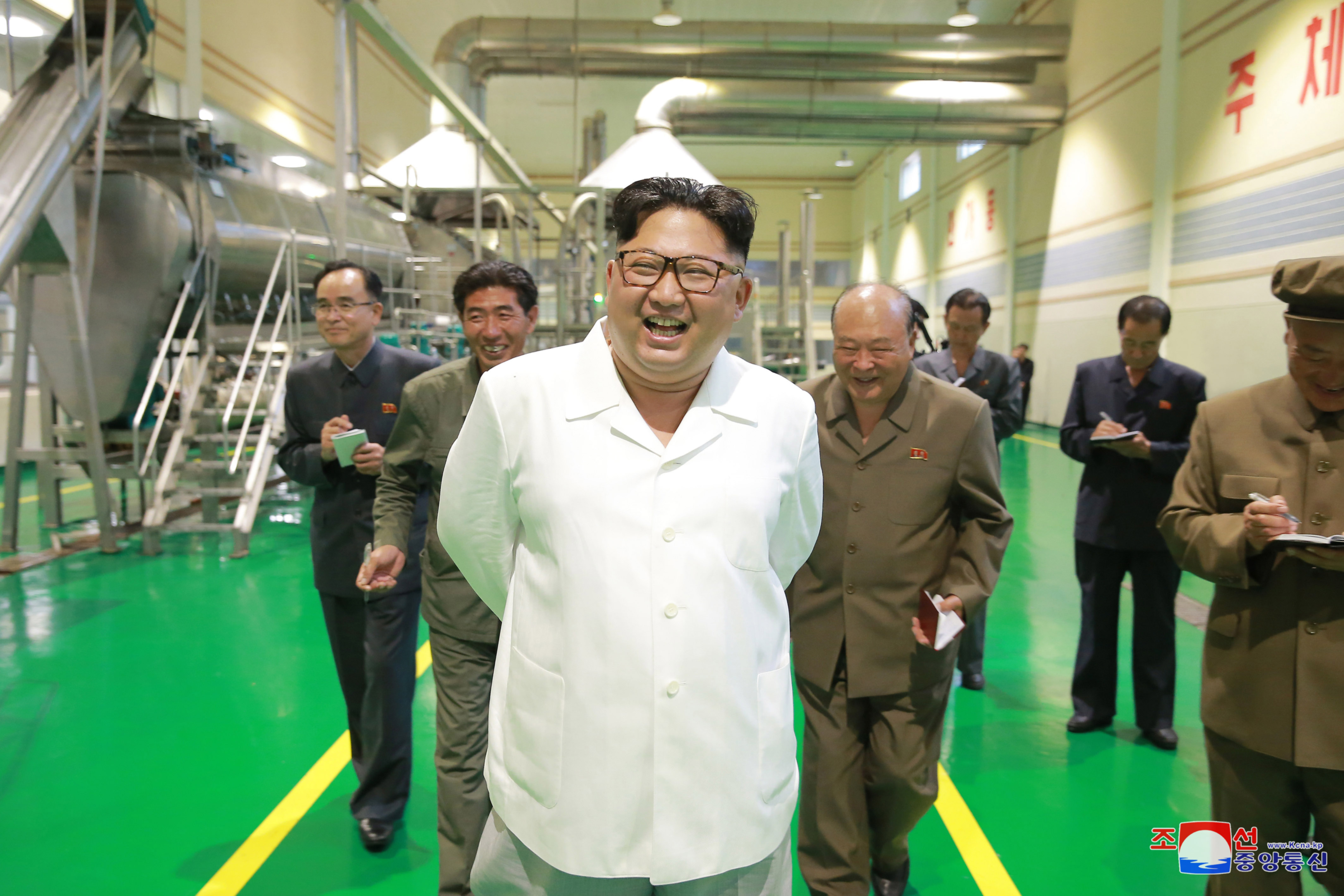
Kim Jong Un smiles while touring the Samjiyo’n Potato Farina Processing Factory (Photo: Rodong Sinmun).
KJU moved on to providing guidance to the Samjiyo’n Potato Farina Production Factory. His return visit was to “discuss measures on the spot with a determination to build a new process producing 2000 tons of processed potato food in a year with potato farina as a raw material, as the process of producing potato farina with a capacity of thousands of tons was built last year.”
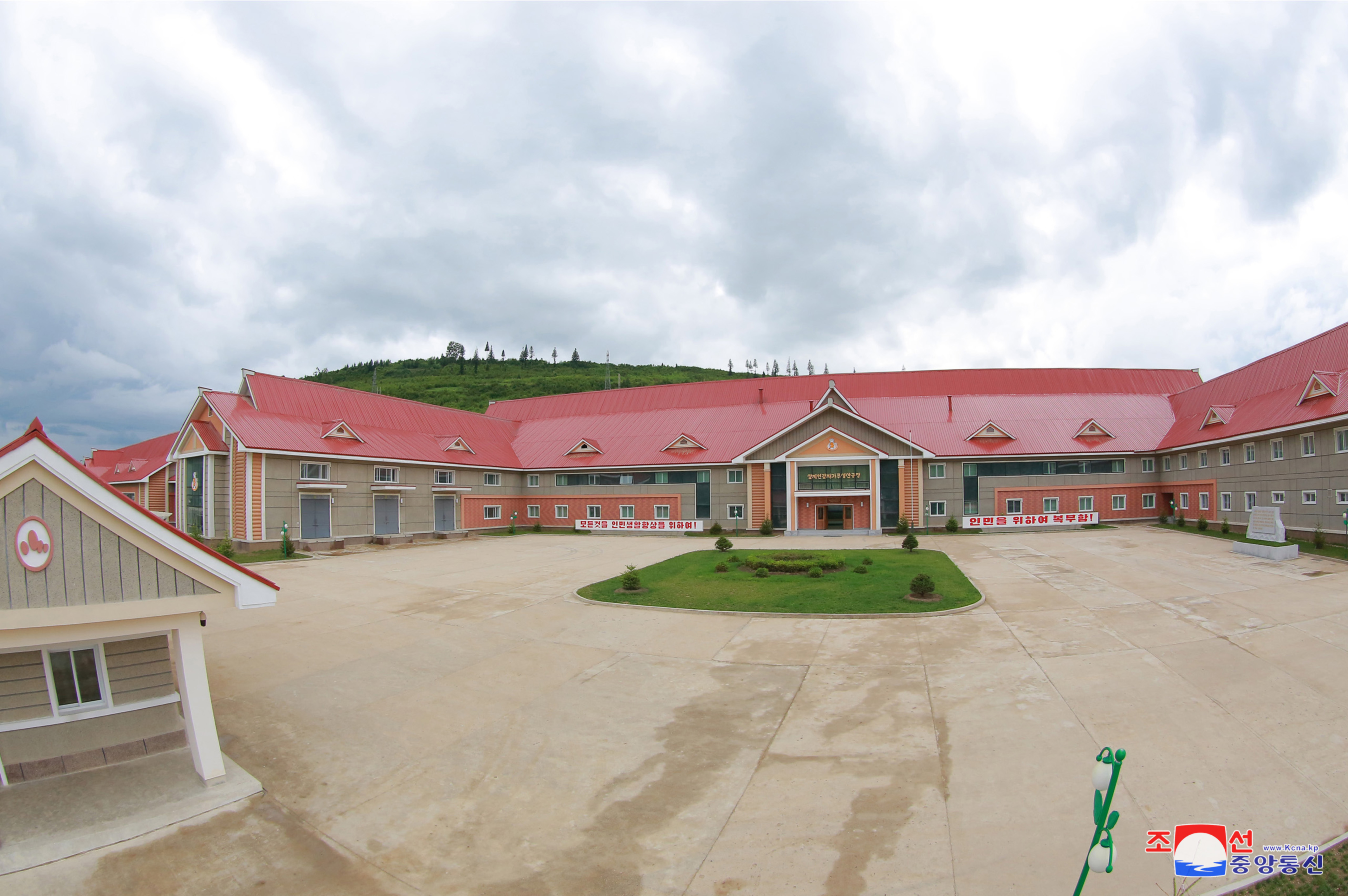
View of the factory’s premises (Photo: KCNA)
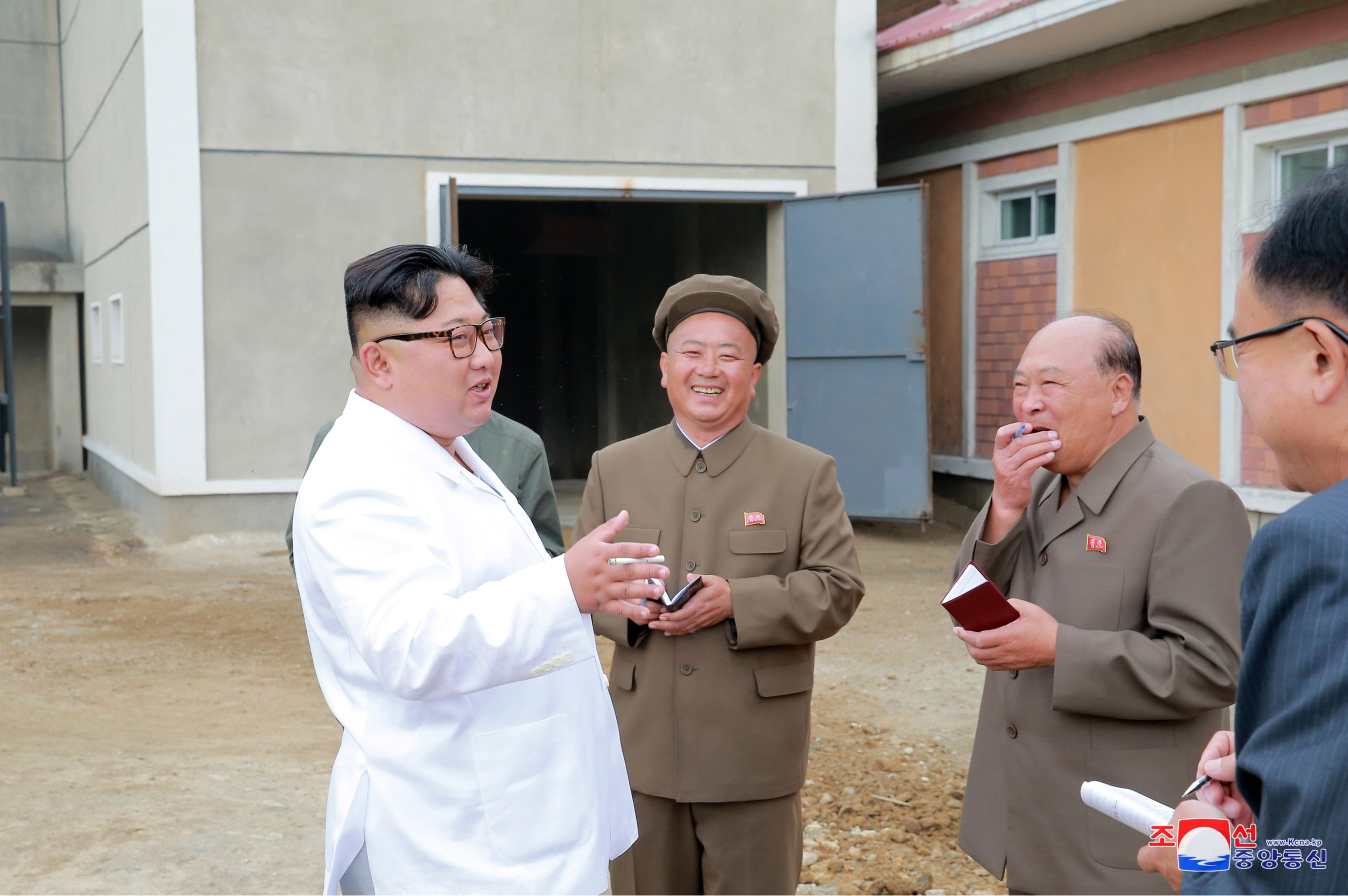
Kim Jong Un outside the food factory (KCNA).
Touring the potato farina process, he remarked that “the factory has not been operated in full capacity after its appearance but it should produce a large amount of farina with the potatoes harvested this year so as to supply a lot of potato farina and processed potato foods to the people.” He also “underscored the need to equip the factory with modern machines for making a variety of foods, including noodles, zeppoles, cakes and nutritious rice, with potato farina and produce tasty and nutritious processed potato foods on a full scale.”
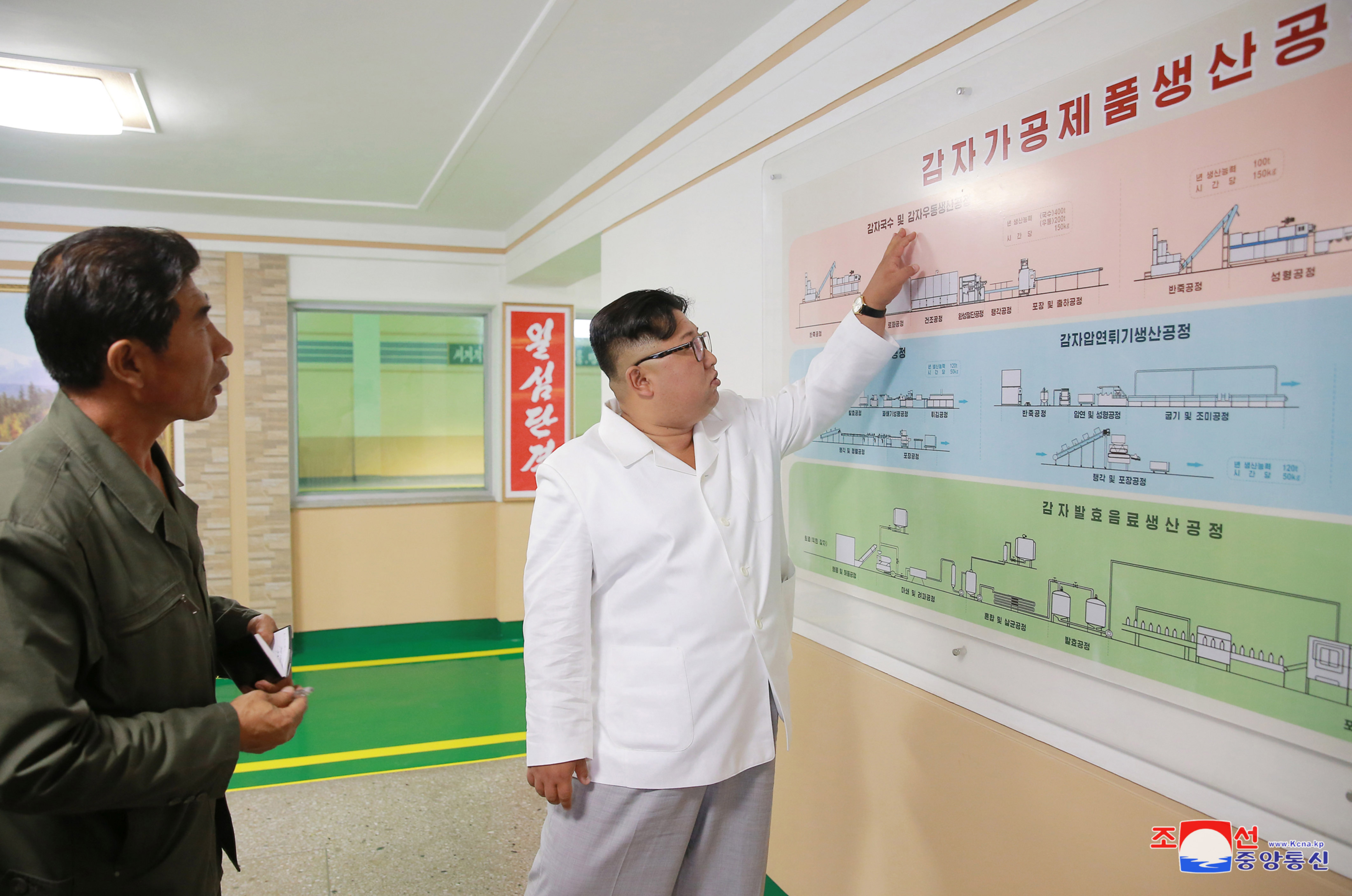
(Photo: KCNA/Rodong Sinmun).
Kim Jong Un “called for building modern potato farina factories at the production bases in the northern alpine region on the basis of the experience and design gained in having built a standard factory that can produce potato farina and various kinds of processed potato foods for the first time in our country.” He “acquainted himself with the storage of produced potato farina and highlighted the need to throughly ensure the quality of potato farina by keeping good conditions for the store and to establish a scientific quality check system.”
He called “upon the factory to take good care of and manage production facilities and equipment on a regular basis, ensure a hygienic environment enough to fit for a foodstuff production process and organize manpower management to ensure profitablity so as to put the production on a normal footing at a high level.” He examined the “Korean-style circulating fluidized-bed boiler newly built at the factory” and noted “with high appreciation that new boiler based on our designs, technology and efforts to suit the actual conditions can supply enough steam needed for production processes with less coal consumption.”
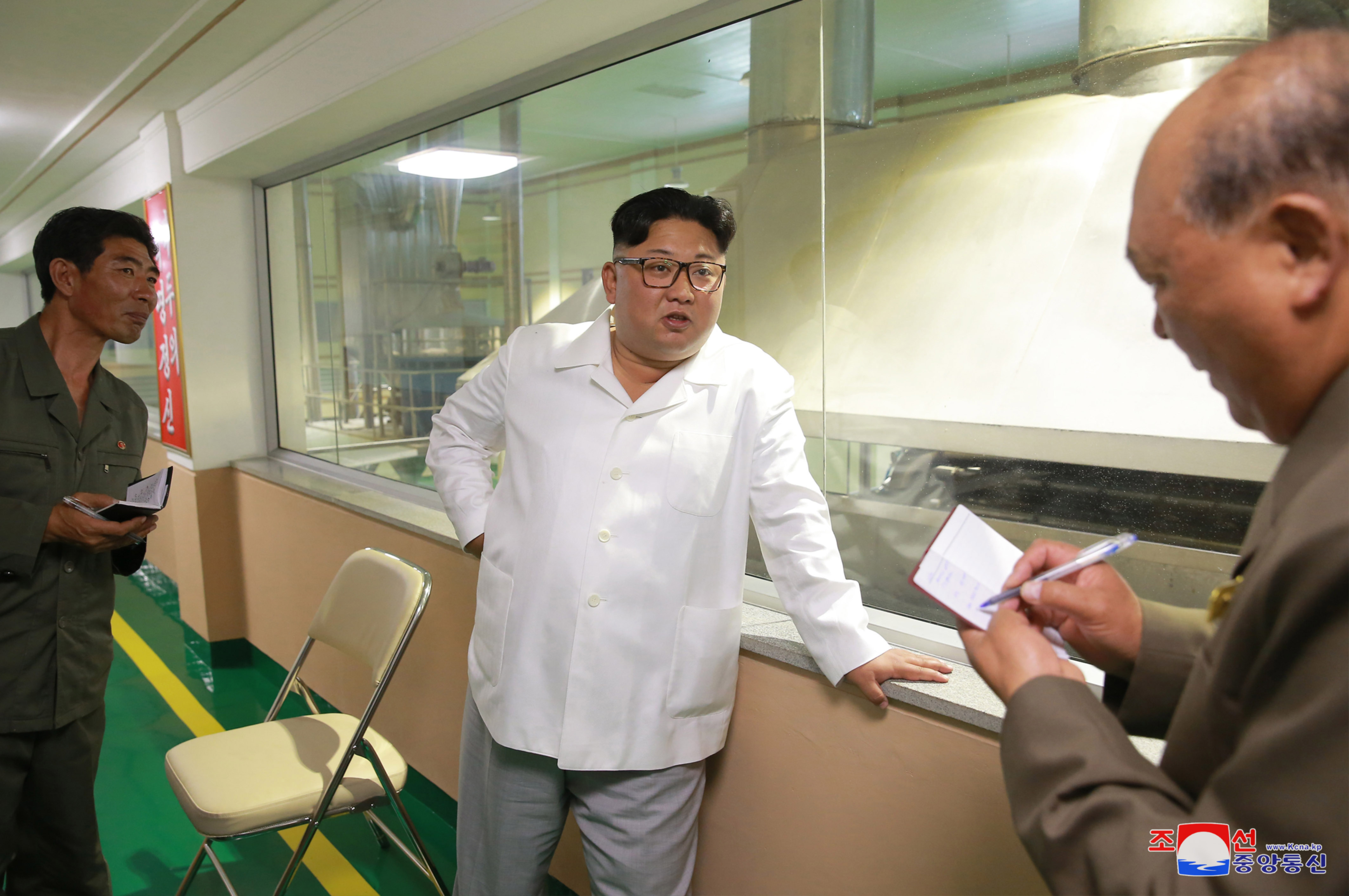
Kim Jong Un issues instruction whilst touring the Samjiyo’n Potato Farina Processing Factory (Photo: KCNA).
Jong Un said that “the factory has set production process in a perfect way and it is urgent to increase the output of potatoes for putting its production on a normal basis.” Having learned about potato farming in Samjiyo’n County, he “stressed the need to conduct sowing in the right season and in a qualitative way, manure and cultivate potato fields in a scientific and technical way and realize the comprehensive mechanization to radically increase the per hectare yield.”
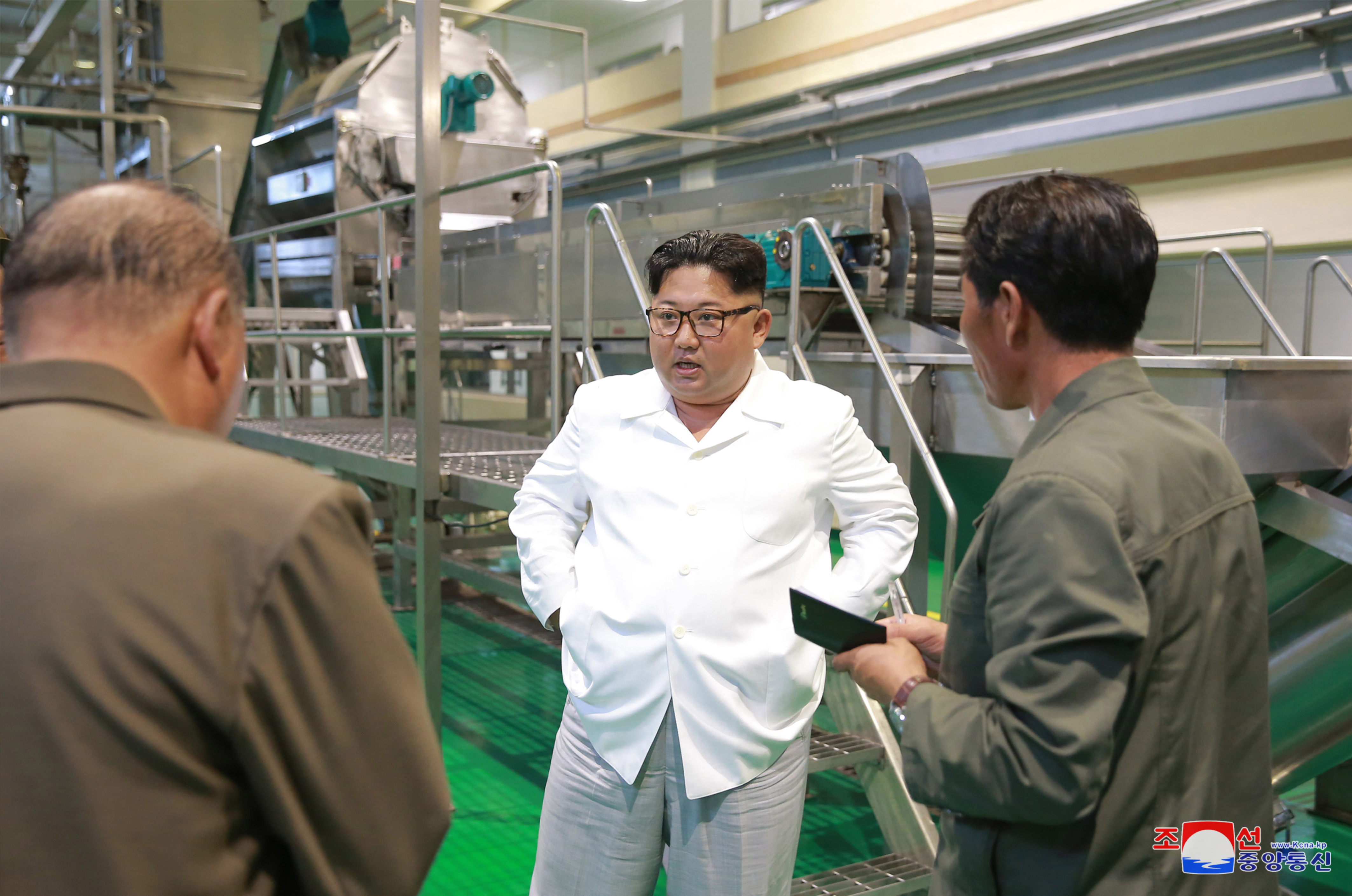
Kim Jong Un tours the farina factory (Photo: Rodong Sinmun).
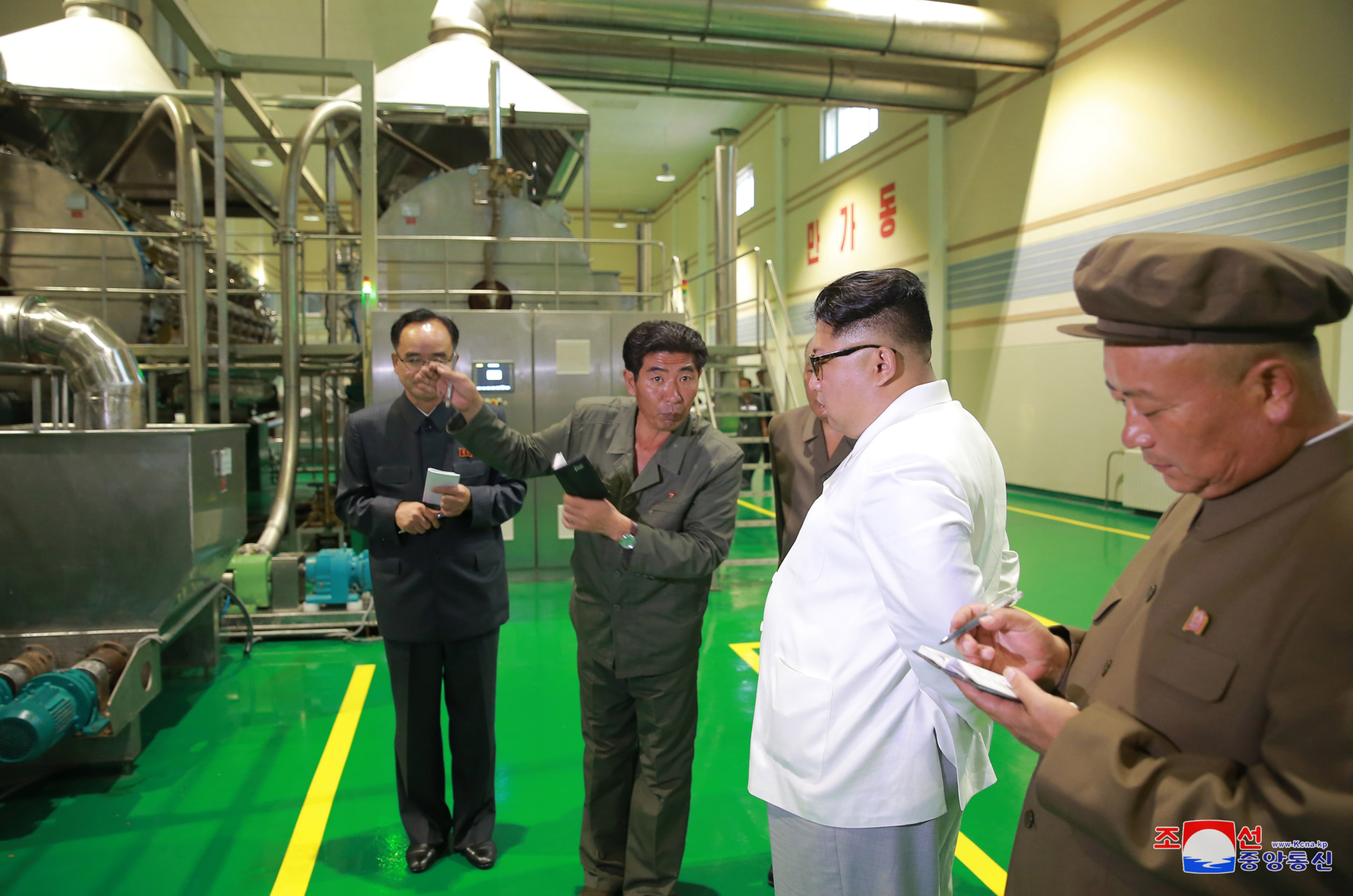
Kim Jong Un is briefed at the farina factory (Photo: Rodong Sinmun).
He remarked that the “Party will solve the problem of supplying vehicles necessary for the organization of a potato transport fleet to carry the harvested potatoes. It is important to gather one in time without wasting even a single potato and fully supply potatoes to the factory.” He said the “Party harbors great expectations over the Samjiyo’n Potato Farina Production Factory which has opened a new path in the potato processing industry of our country.” He “earnestly called on its officials and employees to keep the factory in full-capacity operations in the spirit of devoted service to the people and thus make the factory built by the Party with much care to truly contribute to the improvement of the people’s diet.”
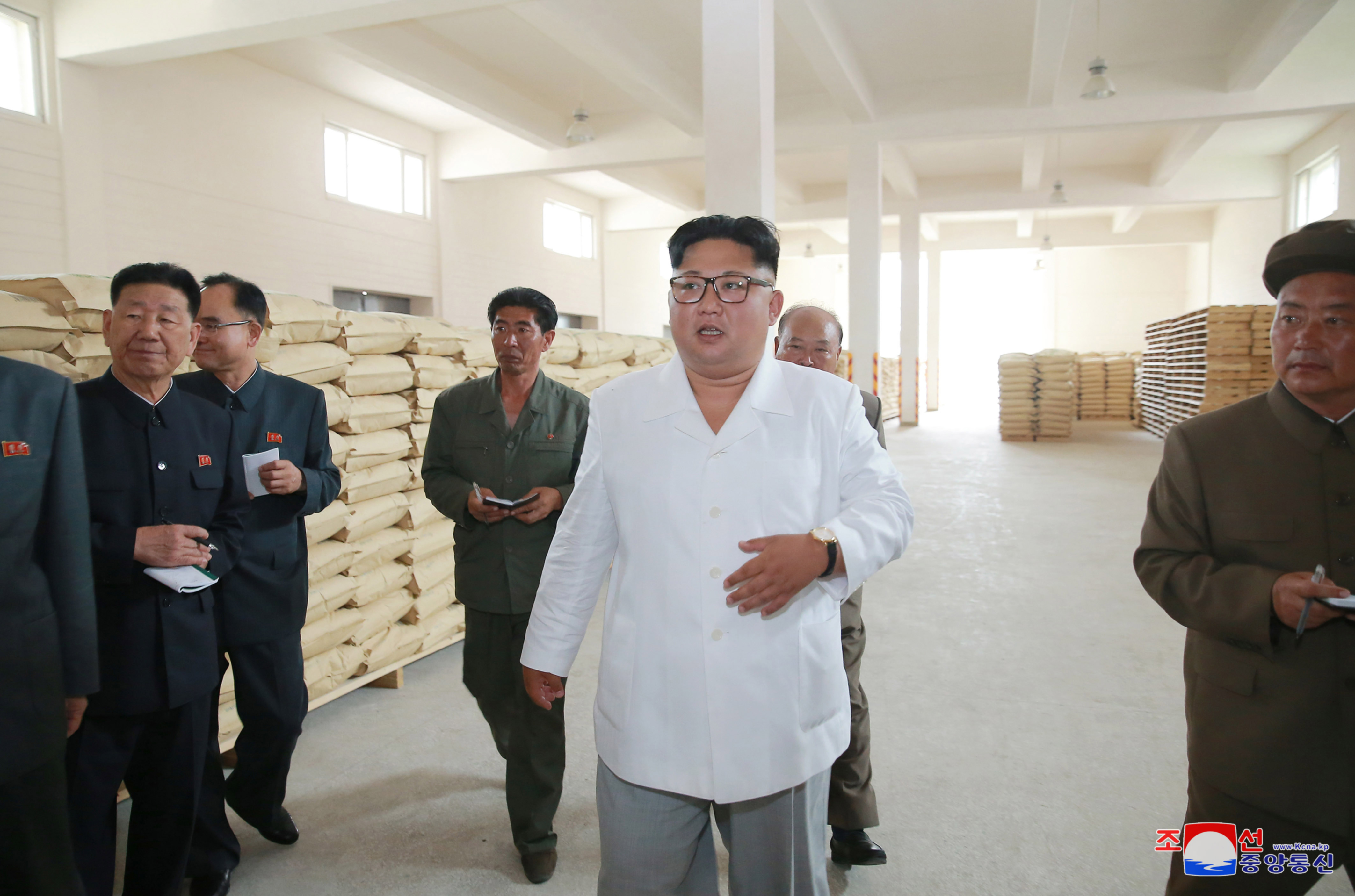
Kim Jong Un tours the Samjiyo’n Potato Farina Factory (Photo: Rodong Sinmun).
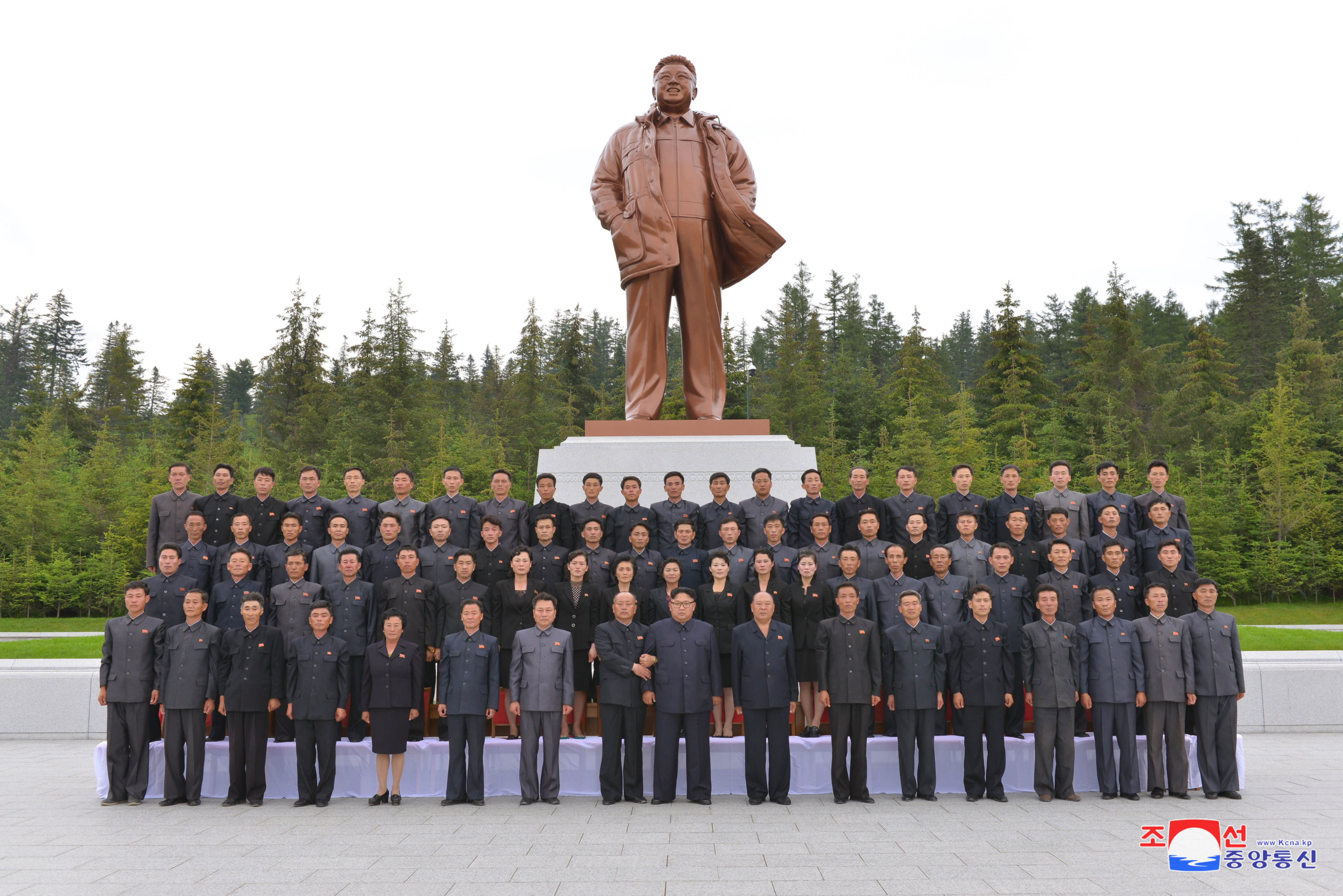
Samjiyo’n County Workers’ Party of Korea Committee pose with Kim Jong Un in front of the KJI statue at Samji Lake (Photo: Rodong Sinmun).
Finally, Jong Un summoned cadres and functionaries of the Samjiyo’n County WPK Committee for a commemorative photo-op and a brief meeting. He started by praising “the officials of the Samjiyo’n County Party Committee for having taken the lead in the dynamic drive true to the intention of the Party Central Committee for building the county, a sacred land of the revolution, into a model of the country and a fairyland of communism.” Then they posed for commemorative photographs.
Jong Un noted that “a county in our country is very important as a local base” and said “that to strengthen the county is an urgent mater in realizing the comprehensive prosperity of the country. The Party Central Committee attaches great important to the duty and role of the county party committee, a hostess and staff which organizes and guides all of the county’s work.”
He stated that “the officials of the county party committee should become core elements steeped in the idea of the Party Central Committee to the marrow of their bones and the county party committee should become the driving force that accepts the Party’s policies in time and takes the lead in efforts to carry them out.” He hoped that “the officials of the county party committee will be true servants of the people” and called “on them to regard and uphold the people as Heaven and as they would leader Kim Jong Il.” He “earnestly said that “the county party committee should be the home which the people frequent to tell of their inward thoughts and it should take roots in the minds of the people.”
He said that “he would become a member of the Samjiyo’n County Party Committee in order to make contributions to sprucing up the county, a native place dear to our people, into the fairyland of people best to live in our country.” He “ardently called upon the officials to work heart and soul for the modernization of the county with a mind to spruce up their own native homes.”